Organisation Behaviour and Motivation Theories: Analysing Unilever Plc
VerifiedAdded on 2023/06/17
|19
|5465
|117
AI Summary
This report analyses the influence of culture, power, politics and motivation theories on individual and team behaviour and performance at Unilever Plc. It evaluates content and process theories of motivation and their effective application to achieve organisational goals. The report also discusses the impact of behaviour of others through effective application of behavioural motivational theories, concepts and models.
Contribute Materials
Your contribution can guide someone’s learning journey. Share your
documents today.
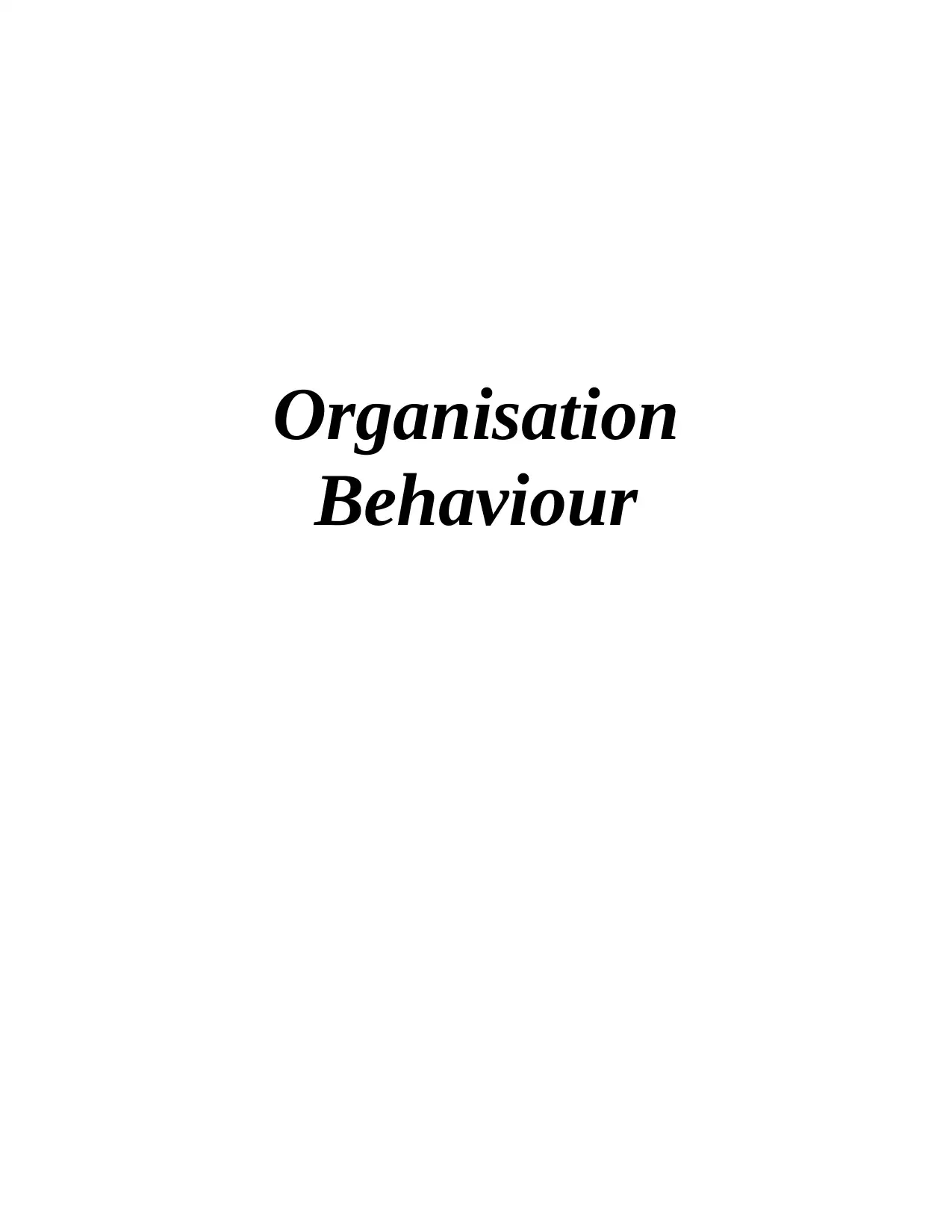
Organisation
Behaviour
Behaviour
Secure Best Marks with AI Grader
Need help grading? Try our AI Grader for instant feedback on your assignments.
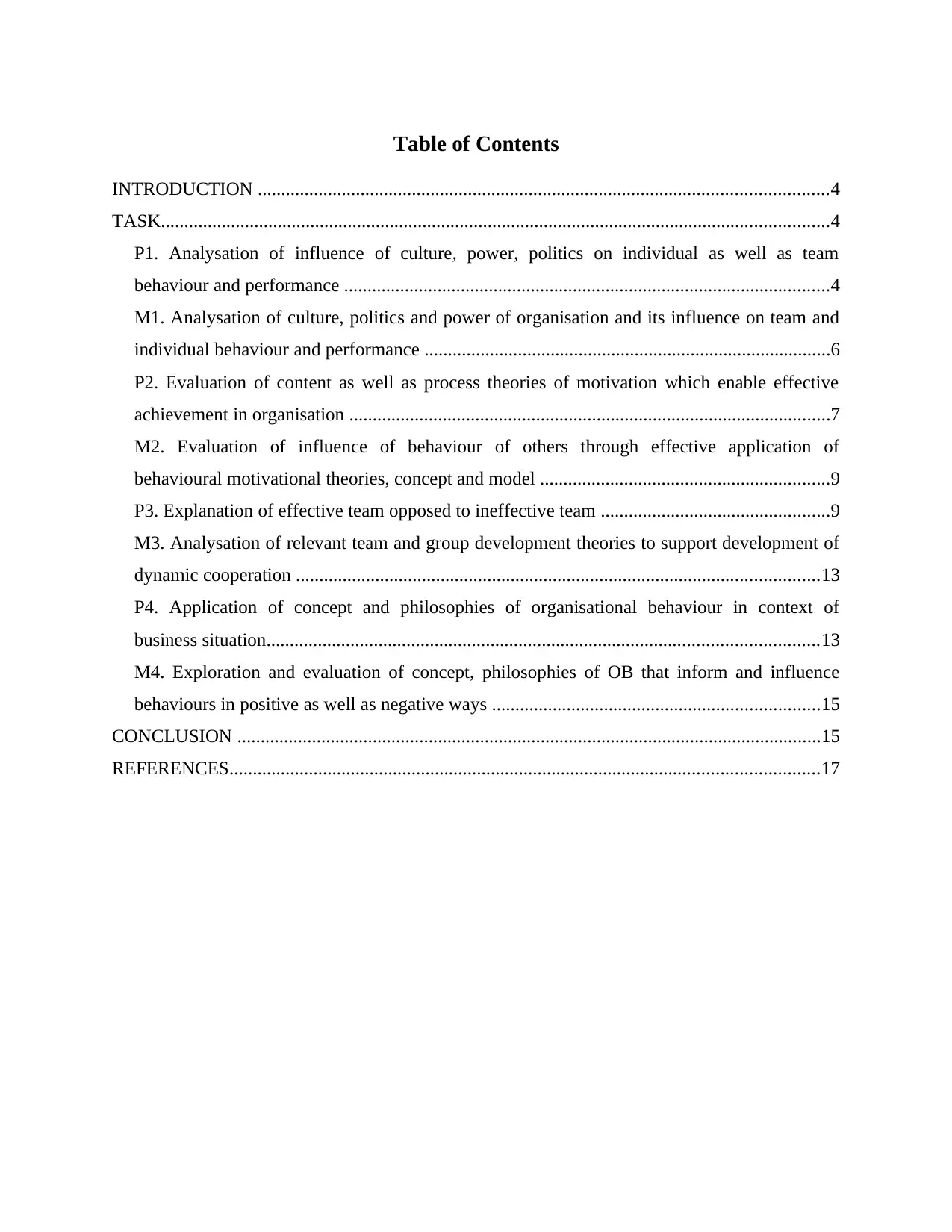
Table of Contents
INTRODUCTION ..........................................................................................................................4
TASK...............................................................................................................................................4
P1. Analysation of influence of culture, power, politics on individual as well as team
behaviour and performance ........................................................................................................4
M1. Analysation of culture, politics and power of organisation and its influence on team and
individual behaviour and performance .......................................................................................6
P2. Evaluation of content as well as process theories of motivation which enable effective
achievement in organisation .......................................................................................................7
M2. Evaluation of influence of behaviour of others through effective application of
behavioural motivational theories, concept and model ..............................................................9
P3. Explanation of effective team opposed to ineffective team .................................................9
M3. Analysation of relevant team and group development theories to support development of
dynamic cooperation ................................................................................................................13
P4. Application of concept and philosophies of organisational behaviour in context of
business situation......................................................................................................................13
M4. Exploration and evaluation of concept, philosophies of OB that inform and influence
behaviours in positive as well as negative ways ......................................................................15
CONCLUSION .............................................................................................................................15
REFERENCES..............................................................................................................................17
INTRODUCTION ..........................................................................................................................4
TASK...............................................................................................................................................4
P1. Analysation of influence of culture, power, politics on individual as well as team
behaviour and performance ........................................................................................................4
M1. Analysation of culture, politics and power of organisation and its influence on team and
individual behaviour and performance .......................................................................................6
P2. Evaluation of content as well as process theories of motivation which enable effective
achievement in organisation .......................................................................................................7
M2. Evaluation of influence of behaviour of others through effective application of
behavioural motivational theories, concept and model ..............................................................9
P3. Explanation of effective team opposed to ineffective team .................................................9
M3. Analysation of relevant team and group development theories to support development of
dynamic cooperation ................................................................................................................13
P4. Application of concept and philosophies of organisational behaviour in context of
business situation......................................................................................................................13
M4. Exploration and evaluation of concept, philosophies of OB that inform and influence
behaviours in positive as well as negative ways ......................................................................15
CONCLUSION .............................................................................................................................15
REFERENCES..............................................................................................................................17
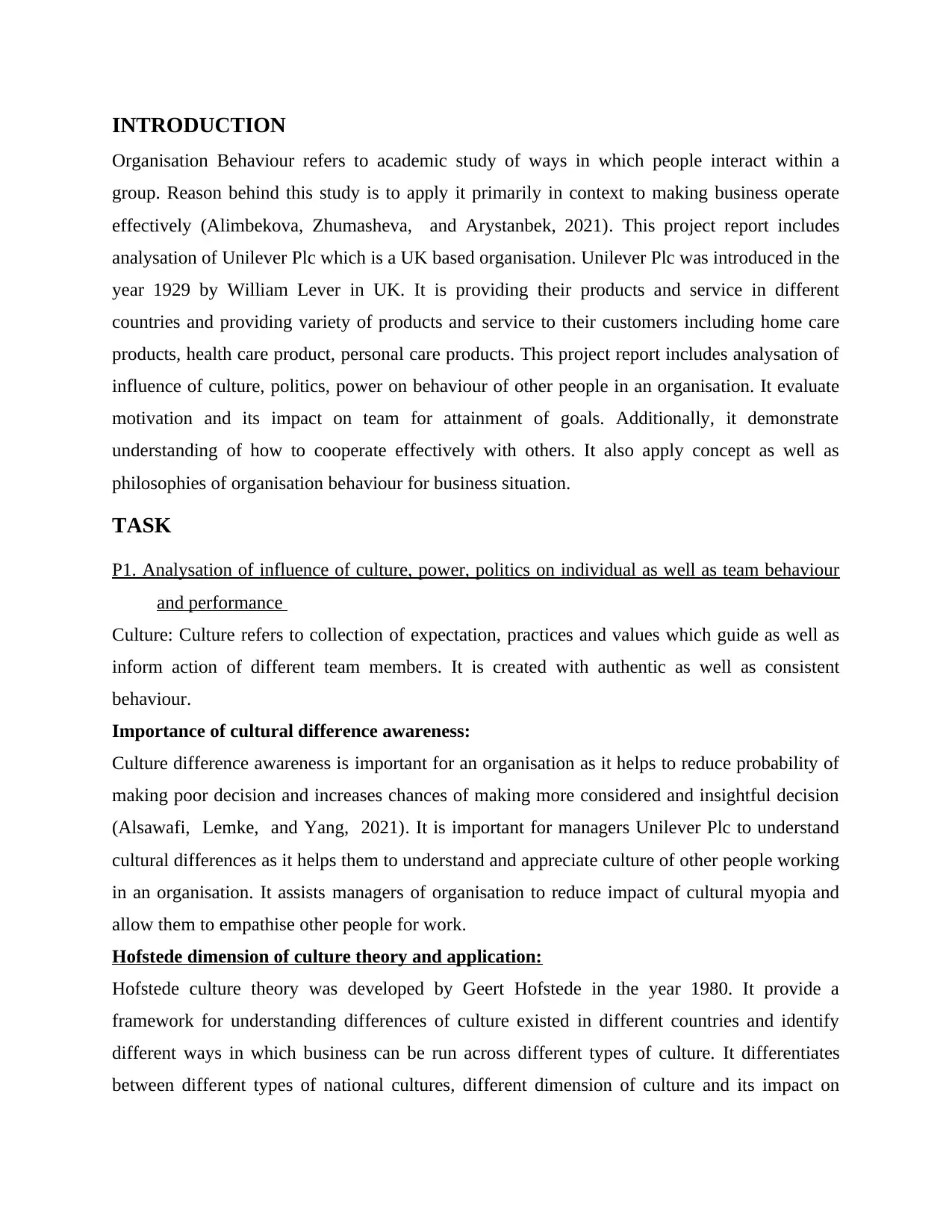
INTRODUCTION
Organisation Behaviour refers to academic study of ways in which people interact within a
group. Reason behind this study is to apply it primarily in context to making business operate
effectively (Alimbekova, Zhumasheva, and Arystanbek, 2021). This project report includes
analysation of Unilever Plc which is a UK based organisation. Unilever Plc was introduced in the
year 1929 by William Lever in UK. It is providing their products and service in different
countries and providing variety of products and service to their customers including home care
products, health care product, personal care products. This project report includes analysation of
influence of culture, politics, power on behaviour of other people in an organisation. It evaluate
motivation and its impact on team for attainment of goals. Additionally, it demonstrate
understanding of how to cooperate effectively with others. It also apply concept as well as
philosophies of organisation behaviour for business situation.
TASK
P1. Analysation of influence of culture, power, politics on individual as well as team behaviour
and performance
Culture: Culture refers to collection of expectation, practices and values which guide as well as
inform action of different team members. It is created with authentic as well as consistent
behaviour.
Importance of cultural difference awareness:
Culture difference awareness is important for an organisation as it helps to reduce probability of
making poor decision and increases chances of making more considered and insightful decision
(Alsawafi, Lemke, and Yang, 2021). It is important for managers Unilever Plc to understand
cultural differences as it helps them to understand and appreciate culture of other people working
in an organisation. It assists managers of organisation to reduce impact of cultural myopia and
allow them to empathise other people for work.
Hofstede dimension of culture theory and application:
Hofstede culture theory was developed by Geert Hofstede in the year 1980. It provide a
framework for understanding differences of culture existed in different countries and identify
different ways in which business can be run across different types of culture. It differentiates
between different types of national cultures, different dimension of culture and its impact on
Organisation Behaviour refers to academic study of ways in which people interact within a
group. Reason behind this study is to apply it primarily in context to making business operate
effectively (Alimbekova, Zhumasheva, and Arystanbek, 2021). This project report includes
analysation of Unilever Plc which is a UK based organisation. Unilever Plc was introduced in the
year 1929 by William Lever in UK. It is providing their products and service in different
countries and providing variety of products and service to their customers including home care
products, health care product, personal care products. This project report includes analysation of
influence of culture, politics, power on behaviour of other people in an organisation. It evaluate
motivation and its impact on team for attainment of goals. Additionally, it demonstrate
understanding of how to cooperate effectively with others. It also apply concept as well as
philosophies of organisation behaviour for business situation.
TASK
P1. Analysation of influence of culture, power, politics on individual as well as team behaviour
and performance
Culture: Culture refers to collection of expectation, practices and values which guide as well as
inform action of different team members. It is created with authentic as well as consistent
behaviour.
Importance of cultural difference awareness:
Culture difference awareness is important for an organisation as it helps to reduce probability of
making poor decision and increases chances of making more considered and insightful decision
(Alsawafi, Lemke, and Yang, 2021). It is important for managers Unilever Plc to understand
cultural differences as it helps them to understand and appreciate culture of other people working
in an organisation. It assists managers of organisation to reduce impact of cultural myopia and
allow them to empathise other people for work.
Hofstede dimension of culture theory and application:
Hofstede culture theory was developed by Geert Hofstede in the year 1980. It provide a
framework for understanding differences of culture existed in different countries and identify
different ways in which business can be run across different types of culture. It differentiates
between different types of national cultures, different dimension of culture and its impact on
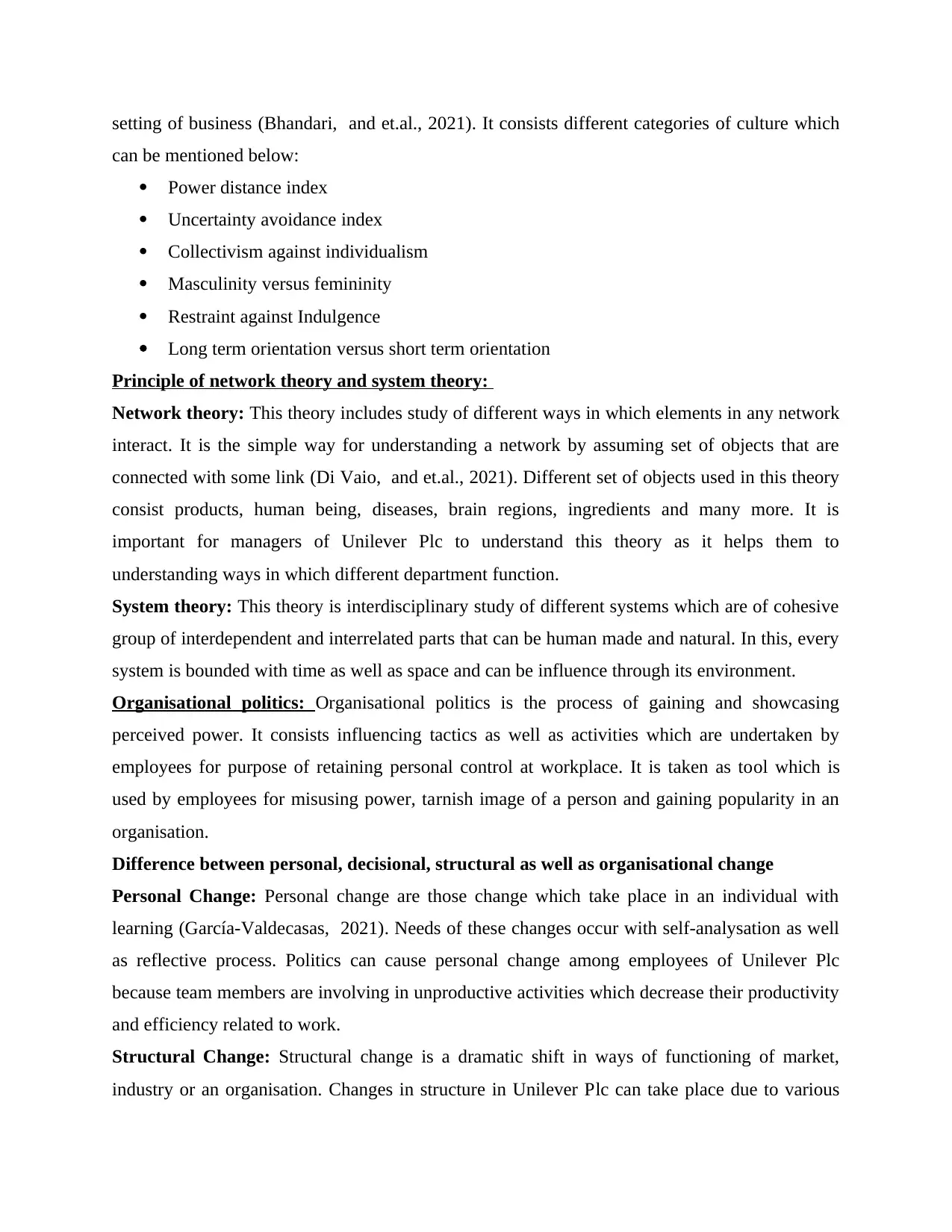
setting of business (Bhandari, and et.al., 2021). It consists different categories of culture which
can be mentioned below:
Power distance index
Uncertainty avoidance index
Collectivism against individualism
Masculinity versus femininity
Restraint against Indulgence
Long term orientation versus short term orientation
Principle of network theory and system theory:
Network theory: This theory includes study of different ways in which elements in any network
interact. It is the simple way for understanding a network by assuming set of objects that are
connected with some link (Di Vaio, and et.al., 2021). Different set of objects used in this theory
consist products, human being, diseases, brain regions, ingredients and many more. It is
important for managers of Unilever Plc to understand this theory as it helps them to
understanding ways in which different department function.
System theory: This theory is interdisciplinary study of different systems which are of cohesive
group of interdependent and interrelated parts that can be human made and natural. In this, every
system is bounded with time as well as space and can be influence through its environment.
Organisational politics: Organisational politics is the process of gaining and showcasing
perceived power. It consists influencing tactics as well as activities which are undertaken by
employees for purpose of retaining personal control at workplace. It is taken as tool which is
used by employees for misusing power, tarnish image of a person and gaining popularity in an
organisation.
Difference between personal, decisional, structural as well as organisational change
Personal Change: Personal change are those change which take place in an individual with
learning (García-Valdecasas, 2021). Needs of these changes occur with self-analysation as well
as reflective process. Politics can cause personal change among employees of Unilever Plc
because team members are involving in unproductive activities which decrease their productivity
and efficiency related to work.
Structural Change: Structural change is a dramatic shift in ways of functioning of market,
industry or an organisation. Changes in structure in Unilever Plc can take place due to various
can be mentioned below:
Power distance index
Uncertainty avoidance index
Collectivism against individualism
Masculinity versus femininity
Restraint against Indulgence
Long term orientation versus short term orientation
Principle of network theory and system theory:
Network theory: This theory includes study of different ways in which elements in any network
interact. It is the simple way for understanding a network by assuming set of objects that are
connected with some link (Di Vaio, and et.al., 2021). Different set of objects used in this theory
consist products, human being, diseases, brain regions, ingredients and many more. It is
important for managers of Unilever Plc to understand this theory as it helps them to
understanding ways in which different department function.
System theory: This theory is interdisciplinary study of different systems which are of cohesive
group of interdependent and interrelated parts that can be human made and natural. In this, every
system is bounded with time as well as space and can be influence through its environment.
Organisational politics: Organisational politics is the process of gaining and showcasing
perceived power. It consists influencing tactics as well as activities which are undertaken by
employees for purpose of retaining personal control at workplace. It is taken as tool which is
used by employees for misusing power, tarnish image of a person and gaining popularity in an
organisation.
Difference between personal, decisional, structural as well as organisational change
Personal Change: Personal change are those change which take place in an individual with
learning (García-Valdecasas, 2021). Needs of these changes occur with self-analysation as well
as reflective process. Politics can cause personal change among employees of Unilever Plc
because team members are involving in unproductive activities which decrease their productivity
and efficiency related to work.
Structural Change: Structural change is a dramatic shift in ways of functioning of market,
industry or an organisation. Changes in structure in Unilever Plc can take place due to various
Secure Best Marks with AI Grader
Need help grading? Try our AI Grader for instant feedback on your assignments.
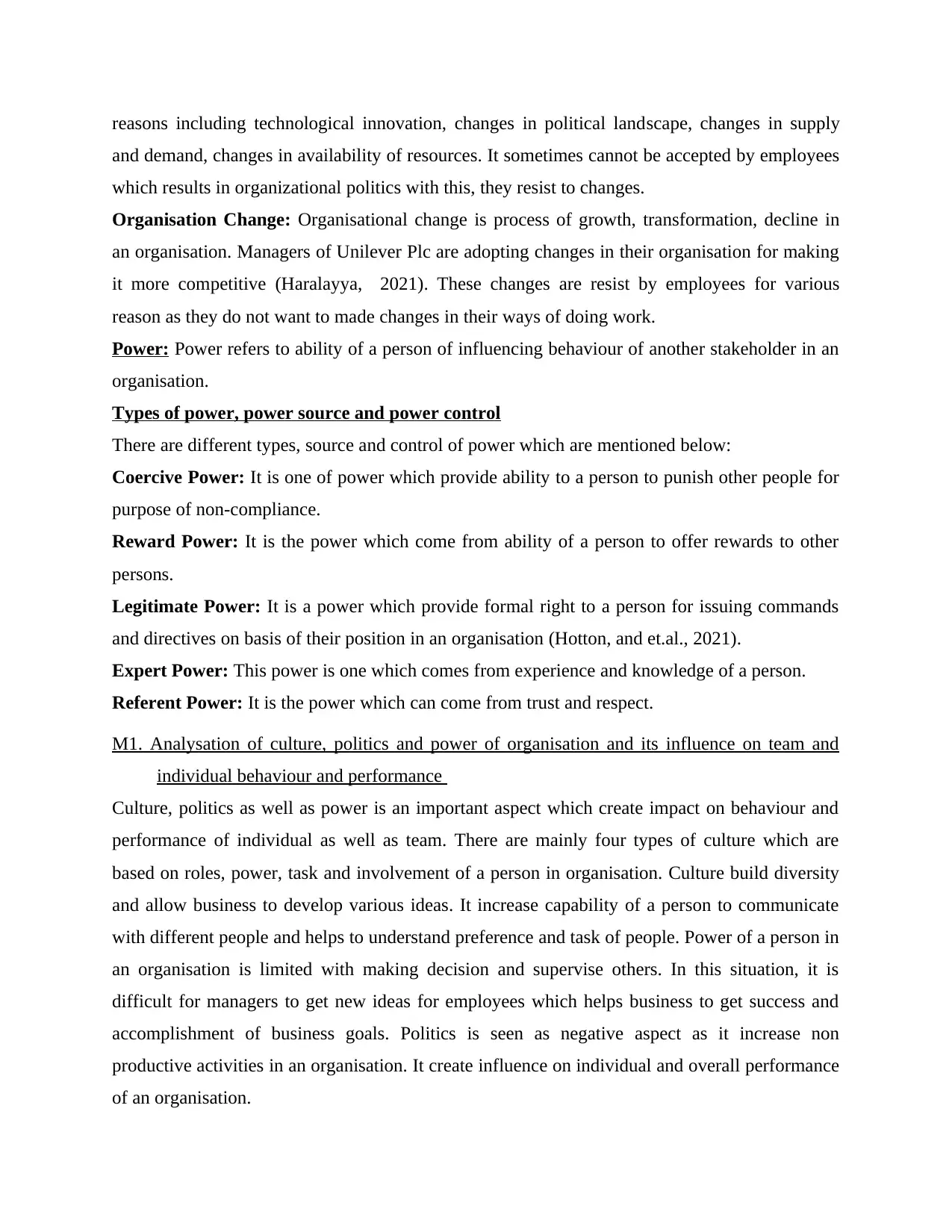
reasons including technological innovation, changes in political landscape, changes in supply
and demand, changes in availability of resources. It sometimes cannot be accepted by employees
which results in organizational politics with this, they resist to changes.
Organisation Change: Organisational change is process of growth, transformation, decline in
an organisation. Managers of Unilever Plc are adopting changes in their organisation for making
it more competitive (Haralayya, 2021). These changes are resist by employees for various
reason as they do not want to made changes in their ways of doing work.
Power: Power refers to ability of a person of influencing behaviour of another stakeholder in an
organisation.
Types of power, power source and power control
There are different types, source and control of power which are mentioned below:
Coercive Power: It is one of power which provide ability to a person to punish other people for
purpose of non-compliance.
Reward Power: It is the power which come from ability of a person to offer rewards to other
persons.
Legitimate Power: It is a power which provide formal right to a person for issuing commands
and directives on basis of their position in an organisation (Hotton, and et.al., 2021).
Expert Power: This power is one which comes from experience and knowledge of a person.
Referent Power: It is the power which can come from trust and respect.
M1. Analysation of culture, politics and power of organisation and its influence on team and
individual behaviour and performance
Culture, politics as well as power is an important aspect which create impact on behaviour and
performance of individual as well as team. There are mainly four types of culture which are
based on roles, power, task and involvement of a person in organisation. Culture build diversity
and allow business to develop various ideas. It increase capability of a person to communicate
with different people and helps to understand preference and task of people. Power of a person in
an organisation is limited with making decision and supervise others. In this situation, it is
difficult for managers to get new ideas for employees which helps business to get success and
accomplishment of business goals. Politics is seen as negative aspect as it increase non
productive activities in an organisation. It create influence on individual and overall performance
of an organisation.
and demand, changes in availability of resources. It sometimes cannot be accepted by employees
which results in organizational politics with this, they resist to changes.
Organisation Change: Organisational change is process of growth, transformation, decline in
an organisation. Managers of Unilever Plc are adopting changes in their organisation for making
it more competitive (Haralayya, 2021). These changes are resist by employees for various
reason as they do not want to made changes in their ways of doing work.
Power: Power refers to ability of a person of influencing behaviour of another stakeholder in an
organisation.
Types of power, power source and power control
There are different types, source and control of power which are mentioned below:
Coercive Power: It is one of power which provide ability to a person to punish other people for
purpose of non-compliance.
Reward Power: It is the power which come from ability of a person to offer rewards to other
persons.
Legitimate Power: It is a power which provide formal right to a person for issuing commands
and directives on basis of their position in an organisation (Hotton, and et.al., 2021).
Expert Power: This power is one which comes from experience and knowledge of a person.
Referent Power: It is the power which can come from trust and respect.
M1. Analysation of culture, politics and power of organisation and its influence on team and
individual behaviour and performance
Culture, politics as well as power is an important aspect which create impact on behaviour and
performance of individual as well as team. There are mainly four types of culture which are
based on roles, power, task and involvement of a person in organisation. Culture build diversity
and allow business to develop various ideas. It increase capability of a person to communicate
with different people and helps to understand preference and task of people. Power of a person in
an organisation is limited with making decision and supervise others. In this situation, it is
difficult for managers to get new ideas for employees which helps business to get success and
accomplishment of business goals. Politics is seen as negative aspect as it increase non
productive activities in an organisation. It create influence on individual and overall performance
of an organisation.
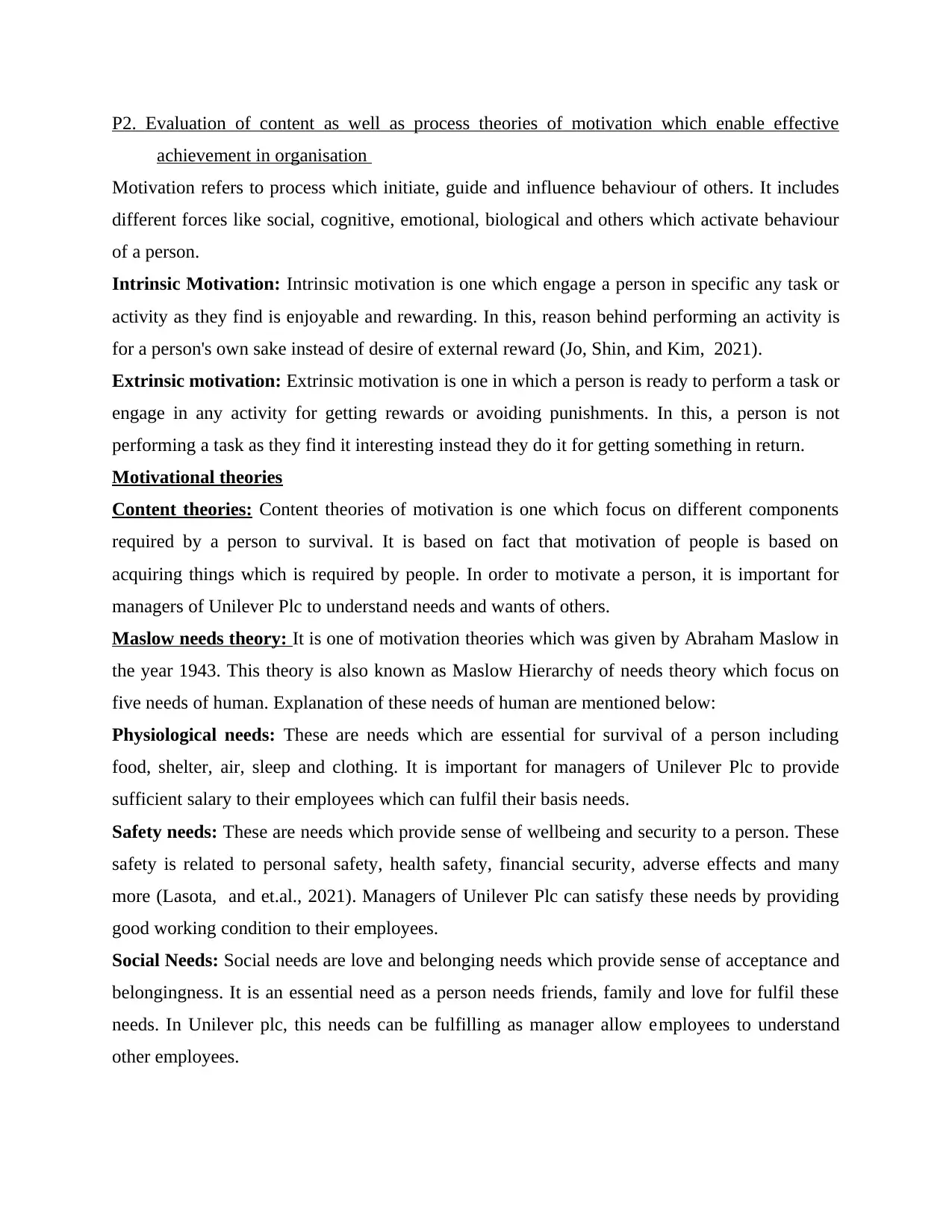
P2. Evaluation of content as well as process theories of motivation which enable effective
achievement in organisation
Motivation refers to process which initiate, guide and influence behaviour of others. It includes
different forces like social, cognitive, emotional, biological and others which activate behaviour
of a person.
Intrinsic Motivation: Intrinsic motivation is one which engage a person in specific any task or
activity as they find is enjoyable and rewarding. In this, reason behind performing an activity is
for a person's own sake instead of desire of external reward (Jo, Shin, and Kim, 2021).
Extrinsic motivation: Extrinsic motivation is one in which a person is ready to perform a task or
engage in any activity for getting rewards or avoiding punishments. In this, a person is not
performing a task as they find it interesting instead they do it for getting something in return.
Motivational theories
Content theories: Content theories of motivation is one which focus on different components
required by a person to survival. It is based on fact that motivation of people is based on
acquiring things which is required by people. In order to motivate a person, it is important for
managers of Unilever Plc to understand needs and wants of others.
Maslow needs theory: It is one of motivation theories which was given by Abraham Maslow in
the year 1943. This theory is also known as Maslow Hierarchy of needs theory which focus on
five needs of human. Explanation of these needs of human are mentioned below:
Physiological needs: These are needs which are essential for survival of a person including
food, shelter, air, sleep and clothing. It is important for managers of Unilever Plc to provide
sufficient salary to their employees which can fulfil their basis needs.
Safety needs: These are needs which provide sense of wellbeing and security to a person. These
safety is related to personal safety, health safety, financial security, adverse effects and many
more (Lasota, and et.al., 2021). Managers of Unilever Plc can satisfy these needs by providing
good working condition to their employees.
Social Needs: Social needs are love and belonging needs which provide sense of acceptance and
belongingness. It is an essential need as a person needs friends, family and love for fulfil these
needs. In Unilever plc, this needs can be fulfilling as manager allow employees to understand
other employees.
achievement in organisation
Motivation refers to process which initiate, guide and influence behaviour of others. It includes
different forces like social, cognitive, emotional, biological and others which activate behaviour
of a person.
Intrinsic Motivation: Intrinsic motivation is one which engage a person in specific any task or
activity as they find is enjoyable and rewarding. In this, reason behind performing an activity is
for a person's own sake instead of desire of external reward (Jo, Shin, and Kim, 2021).
Extrinsic motivation: Extrinsic motivation is one in which a person is ready to perform a task or
engage in any activity for getting rewards or avoiding punishments. In this, a person is not
performing a task as they find it interesting instead they do it for getting something in return.
Motivational theories
Content theories: Content theories of motivation is one which focus on different components
required by a person to survival. It is based on fact that motivation of people is based on
acquiring things which is required by people. In order to motivate a person, it is important for
managers of Unilever Plc to understand needs and wants of others.
Maslow needs theory: It is one of motivation theories which was given by Abraham Maslow in
the year 1943. This theory is also known as Maslow Hierarchy of needs theory which focus on
five needs of human. Explanation of these needs of human are mentioned below:
Physiological needs: These are needs which are essential for survival of a person including
food, shelter, air, sleep and clothing. It is important for managers of Unilever Plc to provide
sufficient salary to their employees which can fulfil their basis needs.
Safety needs: These are needs which provide sense of wellbeing and security to a person. These
safety is related to personal safety, health safety, financial security, adverse effects and many
more (Lasota, and et.al., 2021). Managers of Unilever Plc can satisfy these needs by providing
good working condition to their employees.
Social Needs: Social needs are love and belonging needs which provide sense of acceptance and
belongingness. It is an essential need as a person needs friends, family and love for fulfil these
needs. In Unilever plc, this needs can be fulfilling as manager allow employees to understand
other employees.
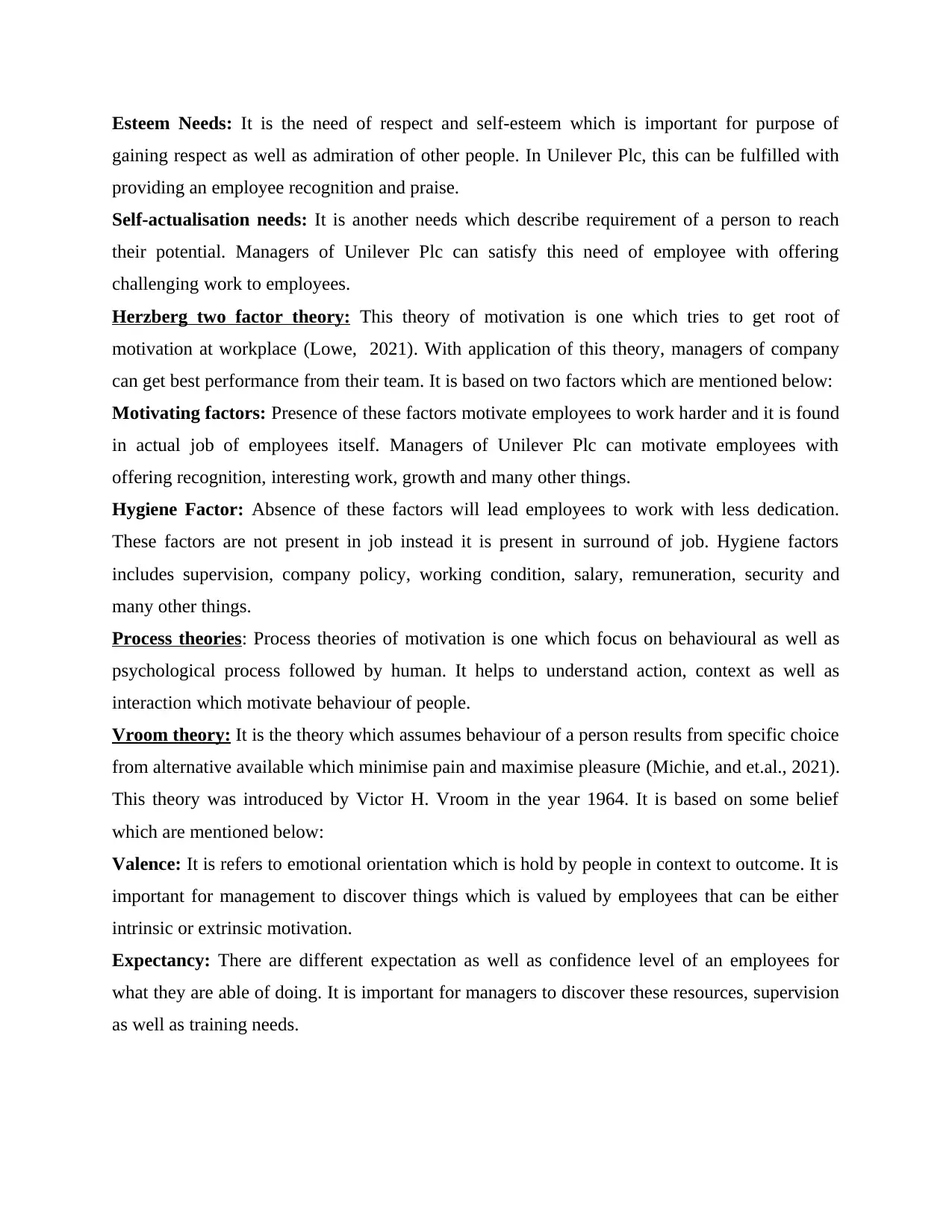
Esteem Needs: It is the need of respect and self-esteem which is important for purpose of
gaining respect as well as admiration of other people. In Unilever Plc, this can be fulfilled with
providing an employee recognition and praise.
Self-actualisation needs: It is another needs which describe requirement of a person to reach
their potential. Managers of Unilever Plc can satisfy this need of employee with offering
challenging work to employees.
Herzberg two factor theory: This theory of motivation is one which tries to get root of
motivation at workplace (Lowe, 2021). With application of this theory, managers of company
can get best performance from their team. It is based on two factors which are mentioned below:
Motivating factors: Presence of these factors motivate employees to work harder and it is found
in actual job of employees itself. Managers of Unilever Plc can motivate employees with
offering recognition, interesting work, growth and many other things.
Hygiene Factor: Absence of these factors will lead employees to work with less dedication.
These factors are not present in job instead it is present in surround of job. Hygiene factors
includes supervision, company policy, working condition, salary, remuneration, security and
many other things.
Process theories: Process theories of motivation is one which focus on behavioural as well as
psychological process followed by human. It helps to understand action, context as well as
interaction which motivate behaviour of people.
Vroom theory: It is the theory which assumes behaviour of a person results from specific choice
from alternative available which minimise pain and maximise pleasure (Michie, and et.al., 2021).
This theory was introduced by Victor H. Vroom in the year 1964. It is based on some belief
which are mentioned below:
Valence: It is refers to emotional orientation which is hold by people in context to outcome. It is
important for management to discover things which is valued by employees that can be either
intrinsic or extrinsic motivation.
Expectancy: There are different expectation as well as confidence level of an employees for
what they are able of doing. It is important for managers to discover these resources, supervision
as well as training needs.
gaining respect as well as admiration of other people. In Unilever Plc, this can be fulfilled with
providing an employee recognition and praise.
Self-actualisation needs: It is another needs which describe requirement of a person to reach
their potential. Managers of Unilever Plc can satisfy this need of employee with offering
challenging work to employees.
Herzberg two factor theory: This theory of motivation is one which tries to get root of
motivation at workplace (Lowe, 2021). With application of this theory, managers of company
can get best performance from their team. It is based on two factors which are mentioned below:
Motivating factors: Presence of these factors motivate employees to work harder and it is found
in actual job of employees itself. Managers of Unilever Plc can motivate employees with
offering recognition, interesting work, growth and many other things.
Hygiene Factor: Absence of these factors will lead employees to work with less dedication.
These factors are not present in job instead it is present in surround of job. Hygiene factors
includes supervision, company policy, working condition, salary, remuneration, security and
many other things.
Process theories: Process theories of motivation is one which focus on behavioural as well as
psychological process followed by human. It helps to understand action, context as well as
interaction which motivate behaviour of people.
Vroom theory: It is the theory which assumes behaviour of a person results from specific choice
from alternative available which minimise pain and maximise pleasure (Michie, and et.al., 2021).
This theory was introduced by Victor H. Vroom in the year 1964. It is based on some belief
which are mentioned below:
Valence: It is refers to emotional orientation which is hold by people in context to outcome. It is
important for management to discover things which is valued by employees that can be either
intrinsic or extrinsic motivation.
Expectancy: There are different expectation as well as confidence level of an employees for
what they are able of doing. It is important for managers to discover these resources, supervision
as well as training needs.
Paraphrase This Document
Need a fresh take? Get an instant paraphrase of this document with our AI Paraphraser
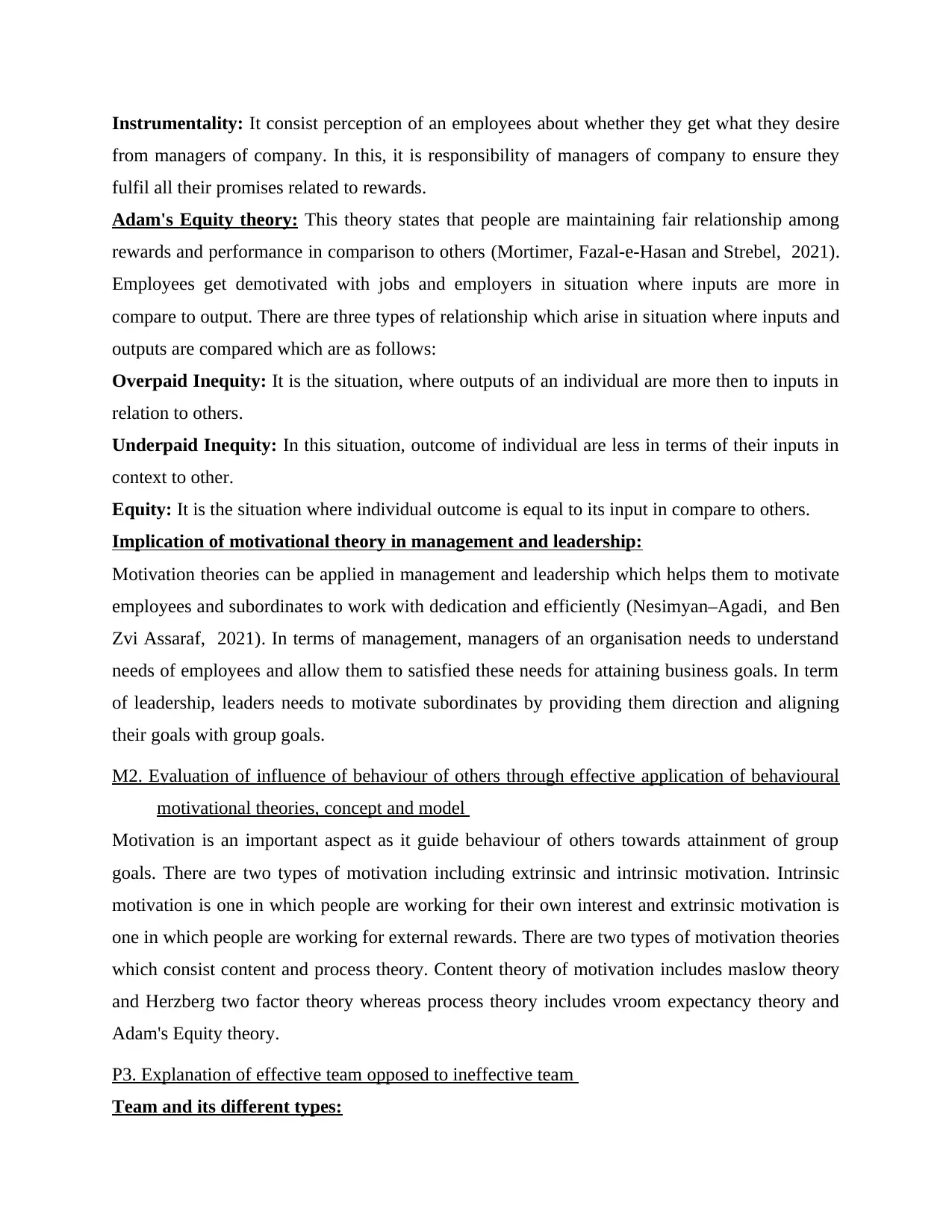
Instrumentality: It consist perception of an employees about whether they get what they desire
from managers of company. In this, it is responsibility of managers of company to ensure they
fulfil all their promises related to rewards.
Adam's Equity theory: This theory states that people are maintaining fair relationship among
rewards and performance in comparison to others (Mortimer, Fazal-e-Hasan and Strebel, 2021).
Employees get demotivated with jobs and employers in situation where inputs are more in
compare to output. There are three types of relationship which arise in situation where inputs and
outputs are compared which are as follows:
Overpaid Inequity: It is the situation, where outputs of an individual are more then to inputs in
relation to others.
Underpaid Inequity: In this situation, outcome of individual are less in terms of their inputs in
context to other.
Equity: It is the situation where individual outcome is equal to its input in compare to others.
Implication of motivational theory in management and leadership:
Motivation theories can be applied in management and leadership which helps them to motivate
employees and subordinates to work with dedication and efficiently (Nesimyan–Agadi, and Ben
Zvi Assaraf, 2021). In terms of management, managers of an organisation needs to understand
needs of employees and allow them to satisfied these needs for attaining business goals. In term
of leadership, leaders needs to motivate subordinates by providing them direction and aligning
their goals with group goals.
M2. Evaluation of influence of behaviour of others through effective application of behavioural
motivational theories, concept and model
Motivation is an important aspect as it guide behaviour of others towards attainment of group
goals. There are two types of motivation including extrinsic and intrinsic motivation. Intrinsic
motivation is one in which people are working for their own interest and extrinsic motivation is
one in which people are working for external rewards. There are two types of motivation theories
which consist content and process theory. Content theory of motivation includes maslow theory
and Herzberg two factor theory whereas process theory includes vroom expectancy theory and
Adam's Equity theory.
P3. Explanation of effective team opposed to ineffective team
Team and its different types:
from managers of company. In this, it is responsibility of managers of company to ensure they
fulfil all their promises related to rewards.
Adam's Equity theory: This theory states that people are maintaining fair relationship among
rewards and performance in comparison to others (Mortimer, Fazal-e-Hasan and Strebel, 2021).
Employees get demotivated with jobs and employers in situation where inputs are more in
compare to output. There are three types of relationship which arise in situation where inputs and
outputs are compared which are as follows:
Overpaid Inequity: It is the situation, where outputs of an individual are more then to inputs in
relation to others.
Underpaid Inequity: In this situation, outcome of individual are less in terms of their inputs in
context to other.
Equity: It is the situation where individual outcome is equal to its input in compare to others.
Implication of motivational theory in management and leadership:
Motivation theories can be applied in management and leadership which helps them to motivate
employees and subordinates to work with dedication and efficiently (Nesimyan–Agadi, and Ben
Zvi Assaraf, 2021). In terms of management, managers of an organisation needs to understand
needs of employees and allow them to satisfied these needs for attaining business goals. In term
of leadership, leaders needs to motivate subordinates by providing them direction and aligning
their goals with group goals.
M2. Evaluation of influence of behaviour of others through effective application of behavioural
motivational theories, concept and model
Motivation is an important aspect as it guide behaviour of others towards attainment of group
goals. There are two types of motivation including extrinsic and intrinsic motivation. Intrinsic
motivation is one in which people are working for their own interest and extrinsic motivation is
one in which people are working for external rewards. There are two types of motivation theories
which consist content and process theory. Content theory of motivation includes maslow theory
and Herzberg two factor theory whereas process theory includes vroom expectancy theory and
Adam's Equity theory.
P3. Explanation of effective team opposed to ineffective team
Team and its different types:
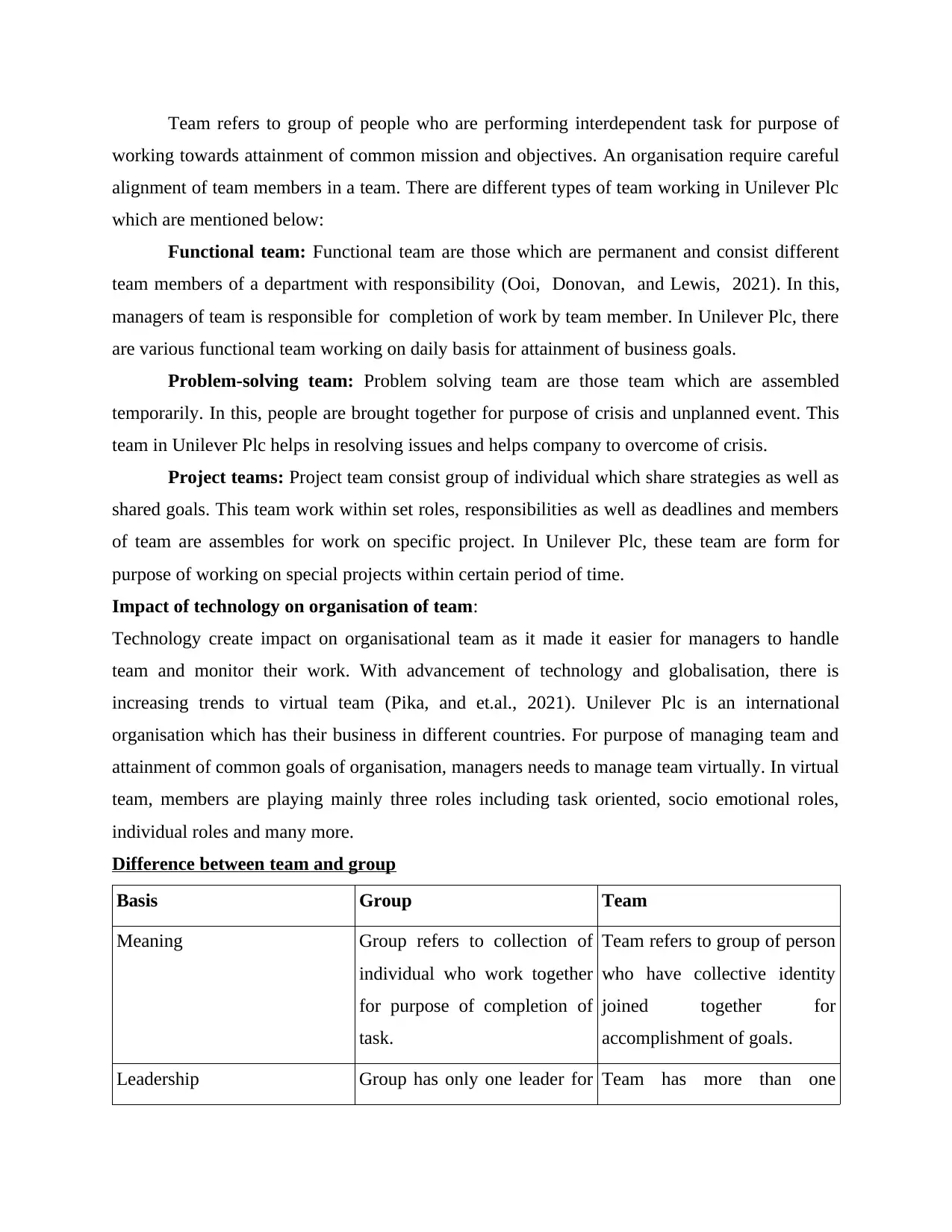
Team refers to group of people who are performing interdependent task for purpose of
working towards attainment of common mission and objectives. An organisation require careful
alignment of team members in a team. There are different types of team working in Unilever Plc
which are mentioned below:
Functional team: Functional team are those which are permanent and consist different
team members of a department with responsibility (Ooi, Donovan, and Lewis, 2021). In this,
managers of team is responsible for completion of work by team member. In Unilever Plc, there
are various functional team working on daily basis for attainment of business goals.
Problem-solving team: Problem solving team are those team which are assembled
temporarily. In this, people are brought together for purpose of crisis and unplanned event. This
team in Unilever Plc helps in resolving issues and helps company to overcome of crisis.
Project teams: Project team consist group of individual which share strategies as well as
shared goals. This team work within set roles, responsibilities as well as deadlines and members
of team are assembles for work on specific project. In Unilever Plc, these team are form for
purpose of working on special projects within certain period of time.
Impact of technology on organisation of team:
Technology create impact on organisational team as it made it easier for managers to handle
team and monitor their work. With advancement of technology and globalisation, there is
increasing trends to virtual team (Pika, and et.al., 2021). Unilever Plc is an international
organisation which has their business in different countries. For purpose of managing team and
attainment of common goals of organisation, managers needs to manage team virtually. In virtual
team, members are playing mainly three roles including task oriented, socio emotional roles,
individual roles and many more.
Difference between team and group
Basis Group Team
Meaning Group refers to collection of
individual who work together
for purpose of completion of
task.
Team refers to group of person
who have collective identity
joined together for
accomplishment of goals.
Leadership Group has only one leader for Team has more than one
working towards attainment of common mission and objectives. An organisation require careful
alignment of team members in a team. There are different types of team working in Unilever Plc
which are mentioned below:
Functional team: Functional team are those which are permanent and consist different
team members of a department with responsibility (Ooi, Donovan, and Lewis, 2021). In this,
managers of team is responsible for completion of work by team member. In Unilever Plc, there
are various functional team working on daily basis for attainment of business goals.
Problem-solving team: Problem solving team are those team which are assembled
temporarily. In this, people are brought together for purpose of crisis and unplanned event. This
team in Unilever Plc helps in resolving issues and helps company to overcome of crisis.
Project teams: Project team consist group of individual which share strategies as well as
shared goals. This team work within set roles, responsibilities as well as deadlines and members
of team are assembles for work on specific project. In Unilever Plc, these team are form for
purpose of working on special projects within certain period of time.
Impact of technology on organisation of team:
Technology create impact on organisational team as it made it easier for managers to handle
team and monitor their work. With advancement of technology and globalisation, there is
increasing trends to virtual team (Pika, and et.al., 2021). Unilever Plc is an international
organisation which has their business in different countries. For purpose of managing team and
attainment of common goals of organisation, managers needs to manage team virtually. In virtual
team, members are playing mainly three roles including task oriented, socio emotional roles,
individual roles and many more.
Difference between team and group
Basis Group Team
Meaning Group refers to collection of
individual who work together
for purpose of completion of
task.
Team refers to group of person
who have collective identity
joined together for
accomplishment of goals.
Leadership Group has only one leader for Team has more than one
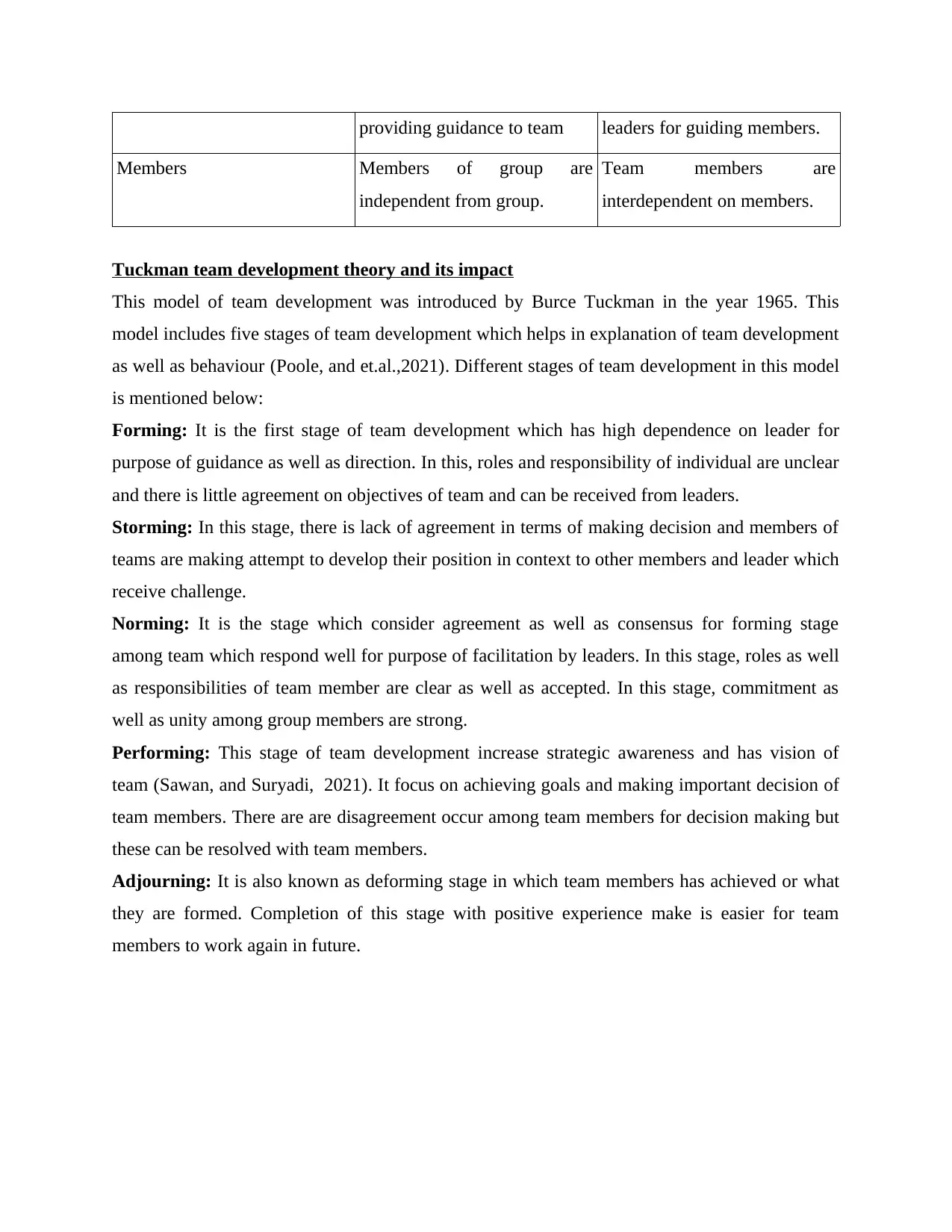
providing guidance to team leaders for guiding members.
Members Members of group are
independent from group.
Team members are
interdependent on members.
Tuckman team development theory and its impact
This model of team development was introduced by Burce Tuckman in the year 1965. This
model includes five stages of team development which helps in explanation of team development
as well as behaviour (Poole, and et.al.,2021). Different stages of team development in this model
is mentioned below:
Forming: It is the first stage of team development which has high dependence on leader for
purpose of guidance as well as direction. In this, roles and responsibility of individual are unclear
and there is little agreement on objectives of team and can be received from leaders.
Storming: In this stage, there is lack of agreement in terms of making decision and members of
teams are making attempt to develop their position in context to other members and leader which
receive challenge.
Norming: It is the stage which consider agreement as well as consensus for forming stage
among team which respond well for purpose of facilitation by leaders. In this stage, roles as well
as responsibilities of team member are clear as well as accepted. In this stage, commitment as
well as unity among group members are strong.
Performing: This stage of team development increase strategic awareness and has vision of
team (Sawan, and Suryadi, 2021). It focus on achieving goals and making important decision of
team members. There are are disagreement occur among team members for decision making but
these can be resolved with team members.
Adjourning: It is also known as deforming stage in which team members has achieved or what
they are formed. Completion of this stage with positive experience make is easier for team
members to work again in future.
Members Members of group are
independent from group.
Team members are
interdependent on members.
Tuckman team development theory and its impact
This model of team development was introduced by Burce Tuckman in the year 1965. This
model includes five stages of team development which helps in explanation of team development
as well as behaviour (Poole, and et.al.,2021). Different stages of team development in this model
is mentioned below:
Forming: It is the first stage of team development which has high dependence on leader for
purpose of guidance as well as direction. In this, roles and responsibility of individual are unclear
and there is little agreement on objectives of team and can be received from leaders.
Storming: In this stage, there is lack of agreement in terms of making decision and members of
teams are making attempt to develop their position in context to other members and leader which
receive challenge.
Norming: It is the stage which consider agreement as well as consensus for forming stage
among team which respond well for purpose of facilitation by leaders. In this stage, roles as well
as responsibilities of team member are clear as well as accepted. In this stage, commitment as
well as unity among group members are strong.
Performing: This stage of team development increase strategic awareness and has vision of
team (Sawan, and Suryadi, 2021). It focus on achieving goals and making important decision of
team members. There are are disagreement occur among team members for decision making but
these can be resolved with team members.
Adjourning: It is also known as deforming stage in which team members has achieved or what
they are formed. Completion of this stage with positive experience make is easier for team
members to work again in future.
Secure Best Marks with AI Grader
Need help grading? Try our AI Grader for instant feedback on your assignments.
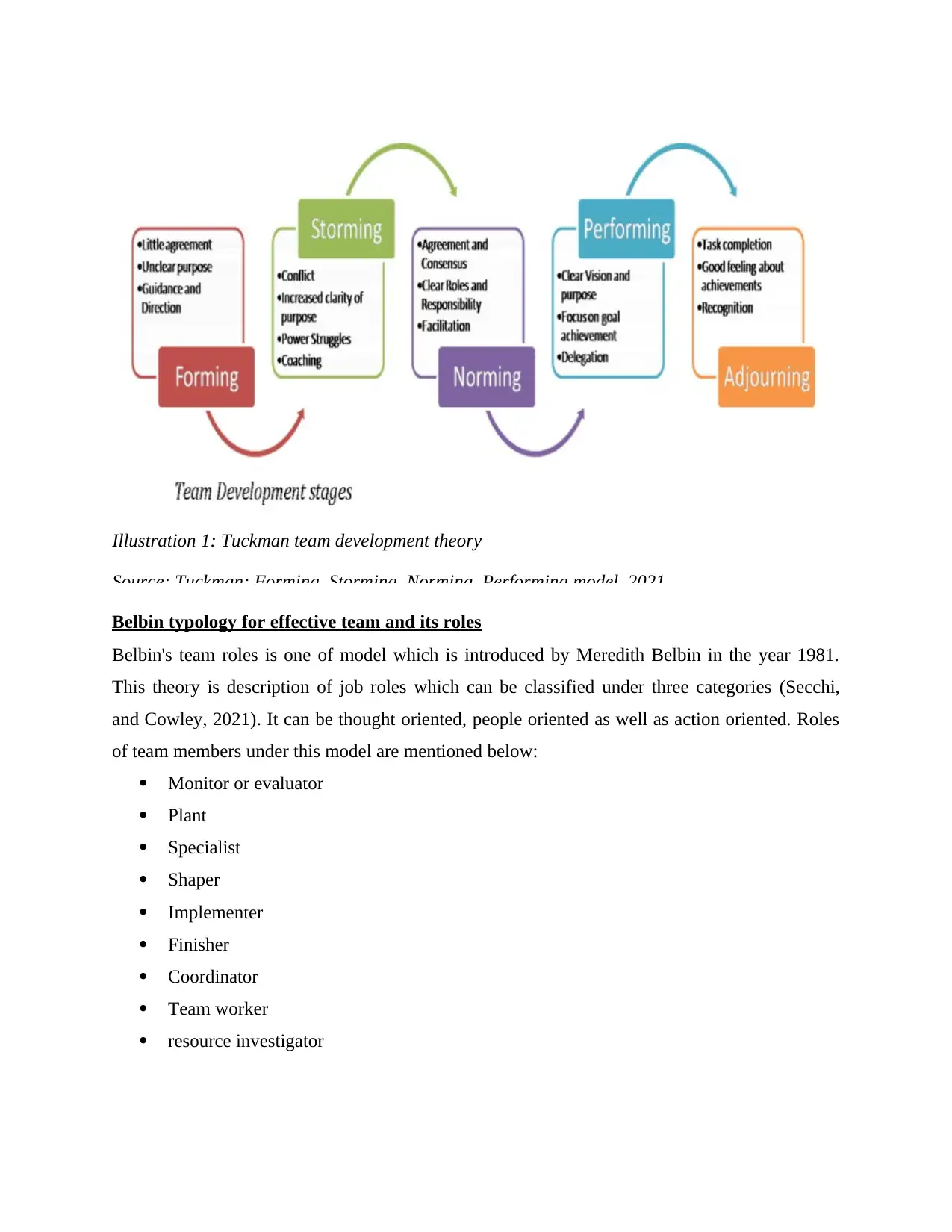
Illustration 1: Tuckman team development theory
Source: Tuckman: Forming, Storming, Norming, Performing model, 2021
Belbin typology for effective team and its roles
Belbin's team roles is one of model which is introduced by Meredith Belbin in the year 1981.
This theory is description of job roles which can be classified under three categories (Secchi,
and Cowley, 2021). It can be thought oriented, people oriented as well as action oriented. Roles
of team members under this model are mentioned below:
Monitor or evaluator
Plant
Specialist
Shaper
Implementer
Finisher
Coordinator
Team worker
resource investigator
Source: Tuckman: Forming, Storming, Norming, Performing model, 2021
Belbin typology for effective team and its roles
Belbin's team roles is one of model which is introduced by Meredith Belbin in the year 1981.
This theory is description of job roles which can be classified under three categories (Secchi,
and Cowley, 2021). It can be thought oriented, people oriented as well as action oriented. Roles
of team members under this model are mentioned below:
Monitor or evaluator
Plant
Specialist
Shaper
Implementer
Finisher
Coordinator
Team worker
resource investigator
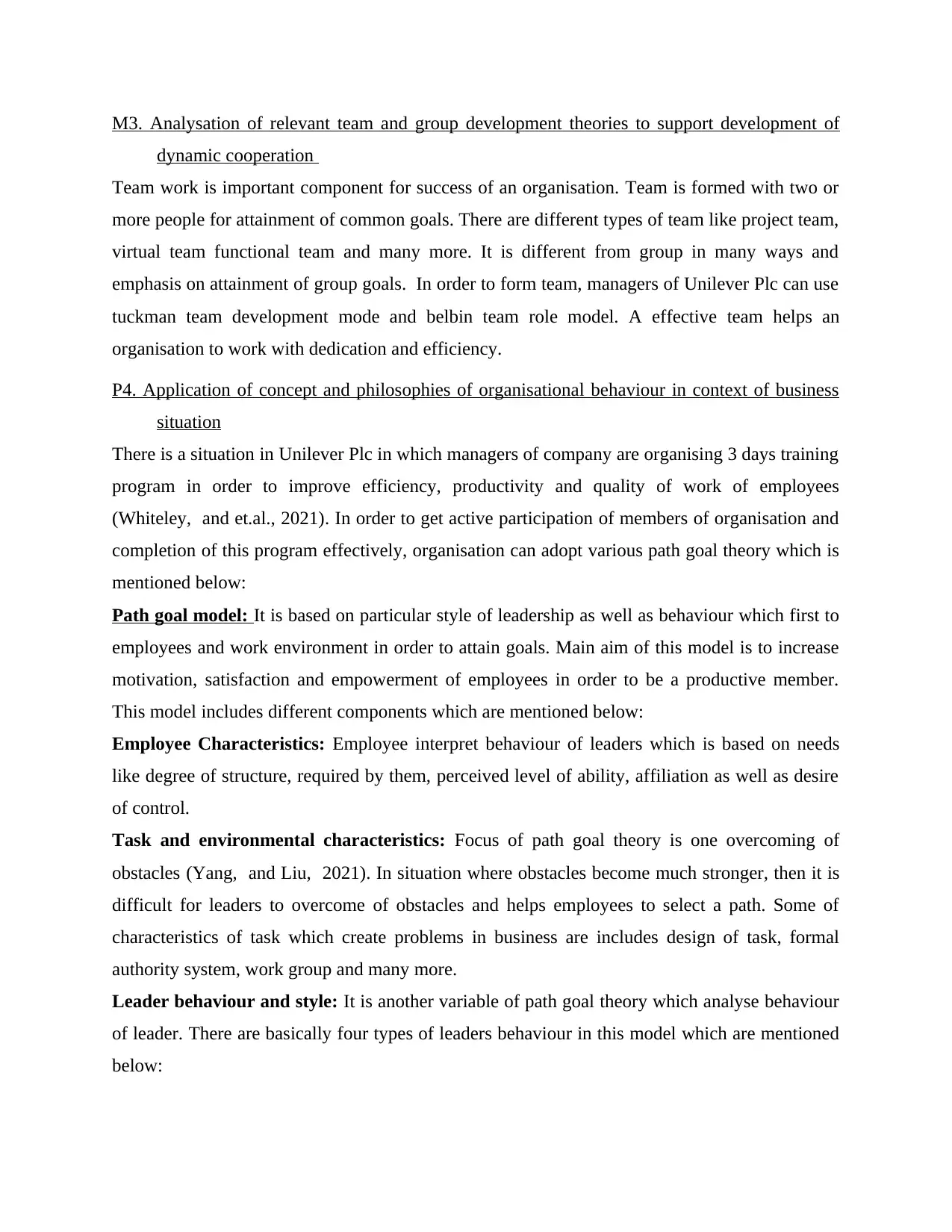
M3. Analysation of relevant team and group development theories to support development of
dynamic cooperation
Team work is important component for success of an organisation. Team is formed with two or
more people for attainment of common goals. There are different types of team like project team,
virtual team functional team and many more. It is different from group in many ways and
emphasis on attainment of group goals. In order to form team, managers of Unilever Plc can use
tuckman team development mode and belbin team role model. A effective team helps an
organisation to work with dedication and efficiency.
P4. Application of concept and philosophies of organisational behaviour in context of business
situation
There is a situation in Unilever Plc in which managers of company are organising 3 days training
program in order to improve efficiency, productivity and quality of work of employees
(Whiteley, and et.al., 2021). In order to get active participation of members of organisation and
completion of this program effectively, organisation can adopt various path goal theory which is
mentioned below:
Path goal model: It is based on particular style of leadership as well as behaviour which first to
employees and work environment in order to attain goals. Main aim of this model is to increase
motivation, satisfaction and empowerment of employees in order to be a productive member.
This model includes different components which are mentioned below:
Employee Characteristics: Employee interpret behaviour of leaders which is based on needs
like degree of structure, required by them, perceived level of ability, affiliation as well as desire
of control.
Task and environmental characteristics: Focus of path goal theory is one overcoming of
obstacles (Yang, and Liu, 2021). In situation where obstacles become much stronger, then it is
difficult for leaders to overcome of obstacles and helps employees to select a path. Some of
characteristics of task which create problems in business are includes design of task, formal
authority system, work group and many more.
Leader behaviour and style: It is another variable of path goal theory which analyse behaviour
of leader. There are basically four types of leaders behaviour in this model which are mentioned
below:
dynamic cooperation
Team work is important component for success of an organisation. Team is formed with two or
more people for attainment of common goals. There are different types of team like project team,
virtual team functional team and many more. It is different from group in many ways and
emphasis on attainment of group goals. In order to form team, managers of Unilever Plc can use
tuckman team development mode and belbin team role model. A effective team helps an
organisation to work with dedication and efficiency.
P4. Application of concept and philosophies of organisational behaviour in context of business
situation
There is a situation in Unilever Plc in which managers of company are organising 3 days training
program in order to improve efficiency, productivity and quality of work of employees
(Whiteley, and et.al., 2021). In order to get active participation of members of organisation and
completion of this program effectively, organisation can adopt various path goal theory which is
mentioned below:
Path goal model: It is based on particular style of leadership as well as behaviour which first to
employees and work environment in order to attain goals. Main aim of this model is to increase
motivation, satisfaction and empowerment of employees in order to be a productive member.
This model includes different components which are mentioned below:
Employee Characteristics: Employee interpret behaviour of leaders which is based on needs
like degree of structure, required by them, perceived level of ability, affiliation as well as desire
of control.
Task and environmental characteristics: Focus of path goal theory is one overcoming of
obstacles (Yang, and Liu, 2021). In situation where obstacles become much stronger, then it is
difficult for leaders to overcome of obstacles and helps employees to select a path. Some of
characteristics of task which create problems in business are includes design of task, formal
authority system, work group and many more.
Leader behaviour and style: It is another variable of path goal theory which analyse behaviour
of leader. There are basically four types of leaders behaviour in this model which are mentioned
below:
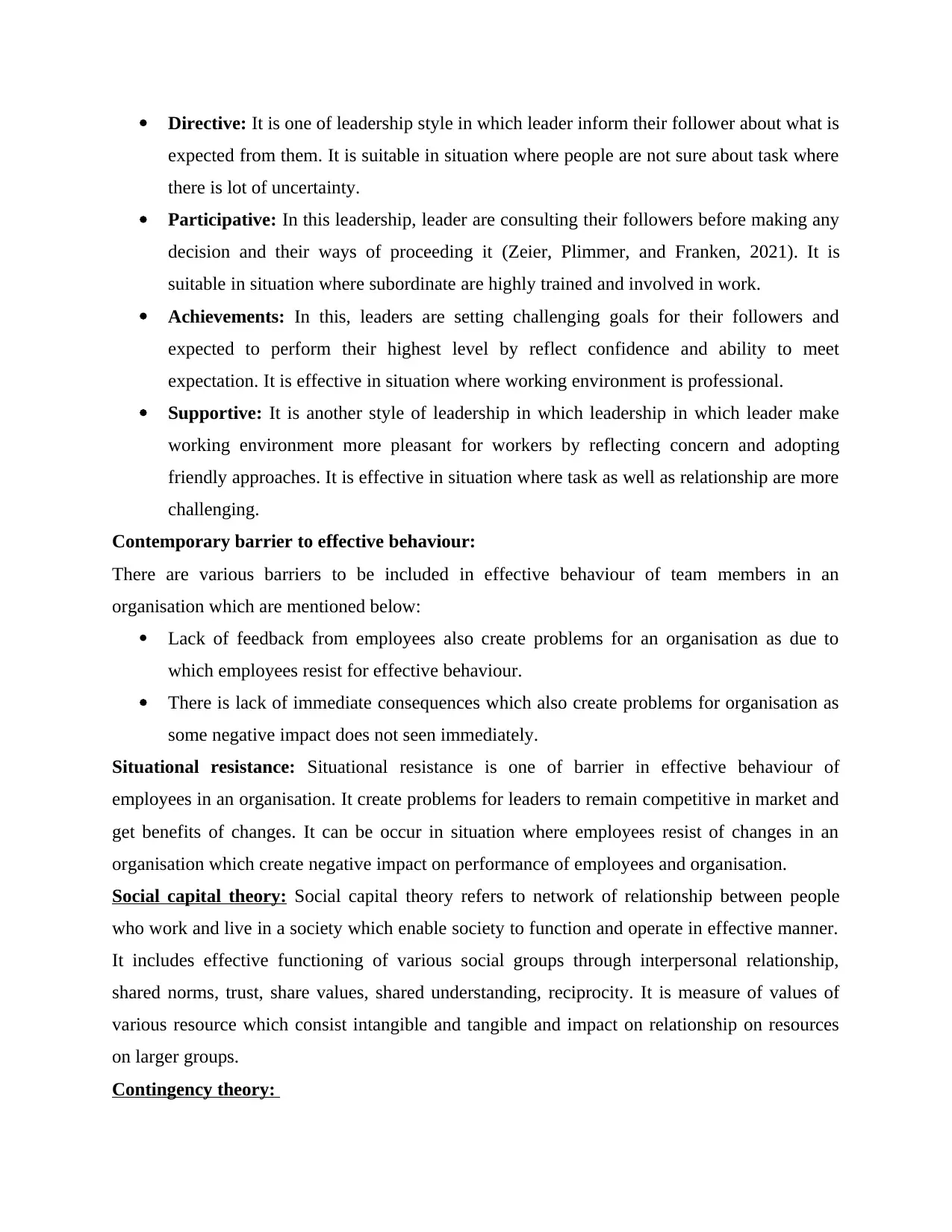
Directive: It is one of leadership style in which leader inform their follower about what is
expected from them. It is suitable in situation where people are not sure about task where
there is lot of uncertainty.
Participative: In this leadership, leader are consulting their followers before making any
decision and their ways of proceeding it (Zeier, Plimmer, and Franken, 2021). It is
suitable in situation where subordinate are highly trained and involved in work.
Achievements: In this, leaders are setting challenging goals for their followers and
expected to perform their highest level by reflect confidence and ability to meet
expectation. It is effective in situation where working environment is professional.
Supportive: It is another style of leadership in which leadership in which leader make
working environment more pleasant for workers by reflecting concern and adopting
friendly approaches. It is effective in situation where task as well as relationship are more
challenging.
Contemporary barrier to effective behaviour:
There are various barriers to be included in effective behaviour of team members in an
organisation which are mentioned below:
Lack of feedback from employees also create problems for an organisation as due to
which employees resist for effective behaviour.
There is lack of immediate consequences which also create problems for organisation as
some negative impact does not seen immediately.
Situational resistance: Situational resistance is one of barrier in effective behaviour of
employees in an organisation. It create problems for leaders to remain competitive in market and
get benefits of changes. It can be occur in situation where employees resist of changes in an
organisation which create negative impact on performance of employees and organisation.
Social capital theory: Social capital theory refers to network of relationship between people
who work and live in a society which enable society to function and operate in effective manner.
It includes effective functioning of various social groups through interpersonal relationship,
shared norms, trust, share values, shared understanding, reciprocity. It is measure of values of
various resource which consist intangible and tangible and impact on relationship on resources
on larger groups.
Contingency theory:
expected from them. It is suitable in situation where people are not sure about task where
there is lot of uncertainty.
Participative: In this leadership, leader are consulting their followers before making any
decision and their ways of proceeding it (Zeier, Plimmer, and Franken, 2021). It is
suitable in situation where subordinate are highly trained and involved in work.
Achievements: In this, leaders are setting challenging goals for their followers and
expected to perform their highest level by reflect confidence and ability to meet
expectation. It is effective in situation where working environment is professional.
Supportive: It is another style of leadership in which leadership in which leader make
working environment more pleasant for workers by reflecting concern and adopting
friendly approaches. It is effective in situation where task as well as relationship are more
challenging.
Contemporary barrier to effective behaviour:
There are various barriers to be included in effective behaviour of team members in an
organisation which are mentioned below:
Lack of feedback from employees also create problems for an organisation as due to
which employees resist for effective behaviour.
There is lack of immediate consequences which also create problems for organisation as
some negative impact does not seen immediately.
Situational resistance: Situational resistance is one of barrier in effective behaviour of
employees in an organisation. It create problems for leaders to remain competitive in market and
get benefits of changes. It can be occur in situation where employees resist of changes in an
organisation which create negative impact on performance of employees and organisation.
Social capital theory: Social capital theory refers to network of relationship between people
who work and live in a society which enable society to function and operate in effective manner.
It includes effective functioning of various social groups through interpersonal relationship,
shared norms, trust, share values, shared understanding, reciprocity. It is measure of values of
various resource which consist intangible and tangible and impact on relationship on resources
on larger groups.
Contingency theory:
Paraphrase This Document
Need a fresh take? Get an instant paraphrase of this document with our AI Paraphraser
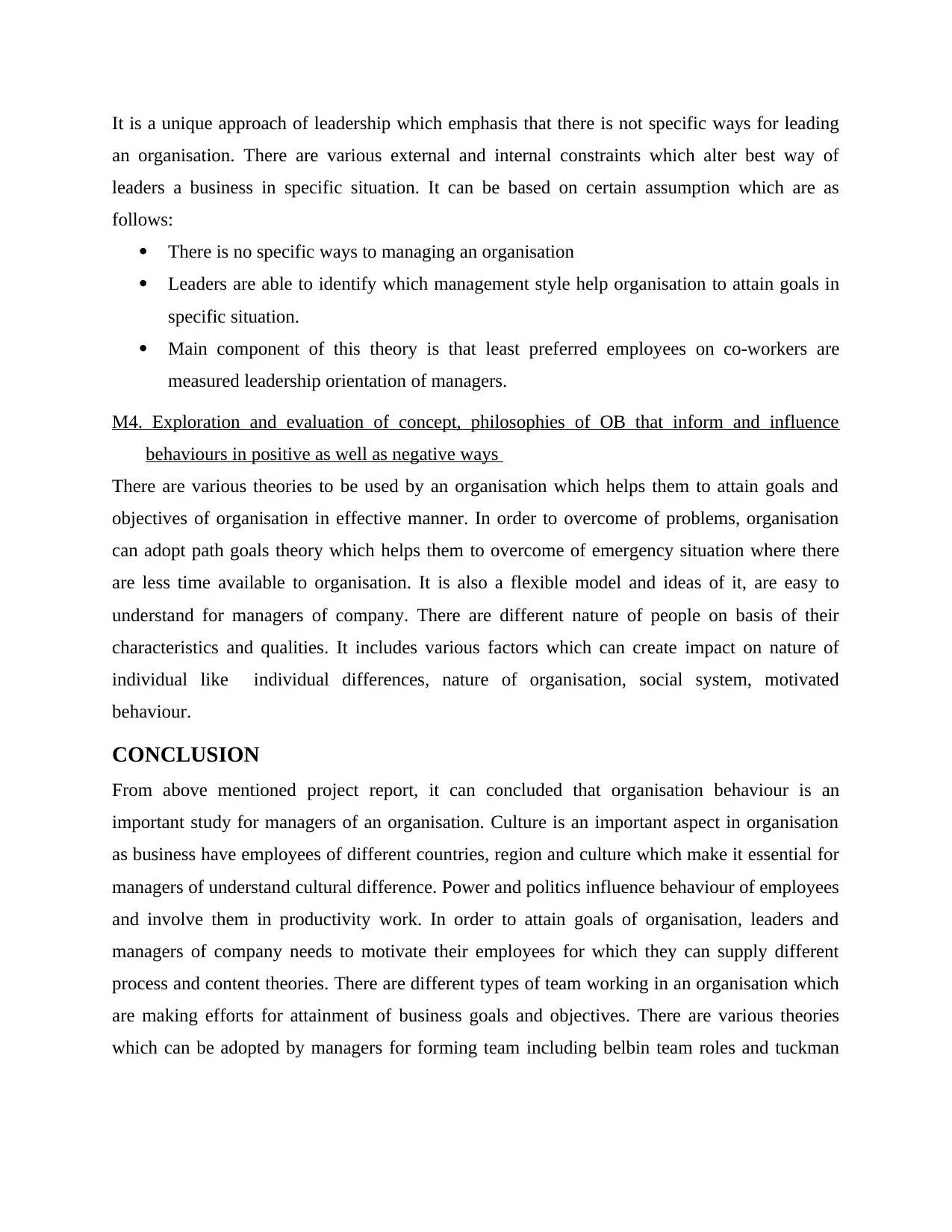
It is a unique approach of leadership which emphasis that there is not specific ways for leading
an organisation. There are various external and internal constraints which alter best way of
leaders a business in specific situation. It can be based on certain assumption which are as
follows:
There is no specific ways to managing an organisation
Leaders are able to identify which management style help organisation to attain goals in
specific situation.
Main component of this theory is that least preferred employees on co-workers are
measured leadership orientation of managers.
M4. Exploration and evaluation of concept, philosophies of OB that inform and influence
behaviours in positive as well as negative ways
There are various theories to be used by an organisation which helps them to attain goals and
objectives of organisation in effective manner. In order to overcome of problems, organisation
can adopt path goals theory which helps them to overcome of emergency situation where there
are less time available to organisation. It is also a flexible model and ideas of it, are easy to
understand for managers of company. There are different nature of people on basis of their
characteristics and qualities. It includes various factors which can create impact on nature of
individual like individual differences, nature of organisation, social system, motivated
behaviour.
CONCLUSION
From above mentioned project report, it can concluded that organisation behaviour is an
important study for managers of an organisation. Culture is an important aspect in organisation
as business have employees of different countries, region and culture which make it essential for
managers of understand cultural difference. Power and politics influence behaviour of employees
and involve them in productivity work. In order to attain goals of organisation, leaders and
managers of company needs to motivate their employees for which they can supply different
process and content theories. There are different types of team working in an organisation which
are making efforts for attainment of business goals and objectives. There are various theories
which can be adopted by managers for forming team including belbin team roles and tuckman
an organisation. There are various external and internal constraints which alter best way of
leaders a business in specific situation. It can be based on certain assumption which are as
follows:
There is no specific ways to managing an organisation
Leaders are able to identify which management style help organisation to attain goals in
specific situation.
Main component of this theory is that least preferred employees on co-workers are
measured leadership orientation of managers.
M4. Exploration and evaluation of concept, philosophies of OB that inform and influence
behaviours in positive as well as negative ways
There are various theories to be used by an organisation which helps them to attain goals and
objectives of organisation in effective manner. In order to overcome of problems, organisation
can adopt path goals theory which helps them to overcome of emergency situation where there
are less time available to organisation. It is also a flexible model and ideas of it, are easy to
understand for managers of company. There are different nature of people on basis of their
characteristics and qualities. It includes various factors which can create impact on nature of
individual like individual differences, nature of organisation, social system, motivated
behaviour.
CONCLUSION
From above mentioned project report, it can concluded that organisation behaviour is an
important study for managers of an organisation. Culture is an important aspect in organisation
as business have employees of different countries, region and culture which make it essential for
managers of understand cultural difference. Power and politics influence behaviour of employees
and involve them in productivity work. In order to attain goals of organisation, leaders and
managers of company needs to motivate their employees for which they can supply different
process and content theories. There are different types of team working in an organisation which
are making efforts for attainment of business goals and objectives. There are various theories
which can be adopted by managers for forming team including belbin team roles and tuckman
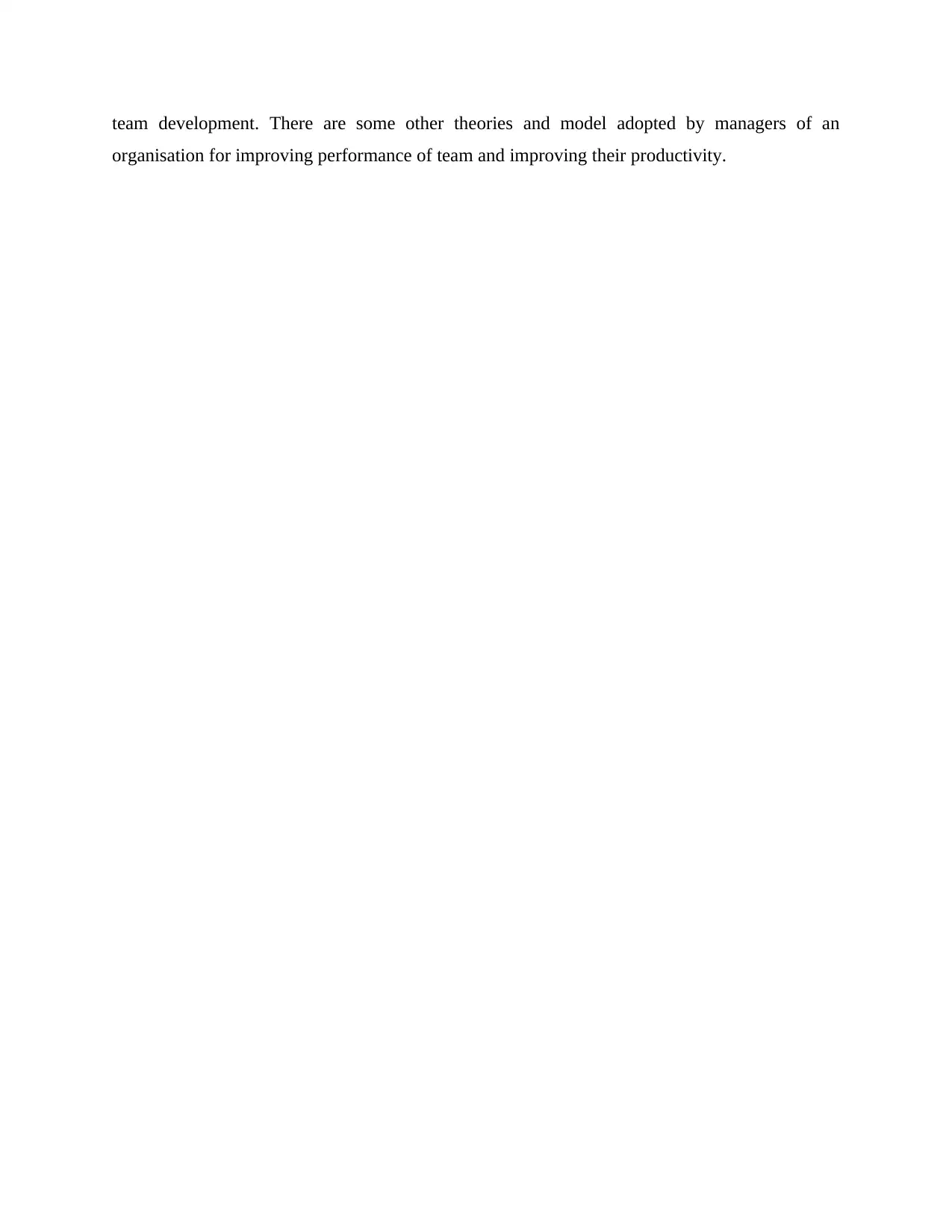
team development. There are some other theories and model adopted by managers of an
organisation for improving performance of team and improving their productivity.
organisation for improving performance of team and improving their productivity.
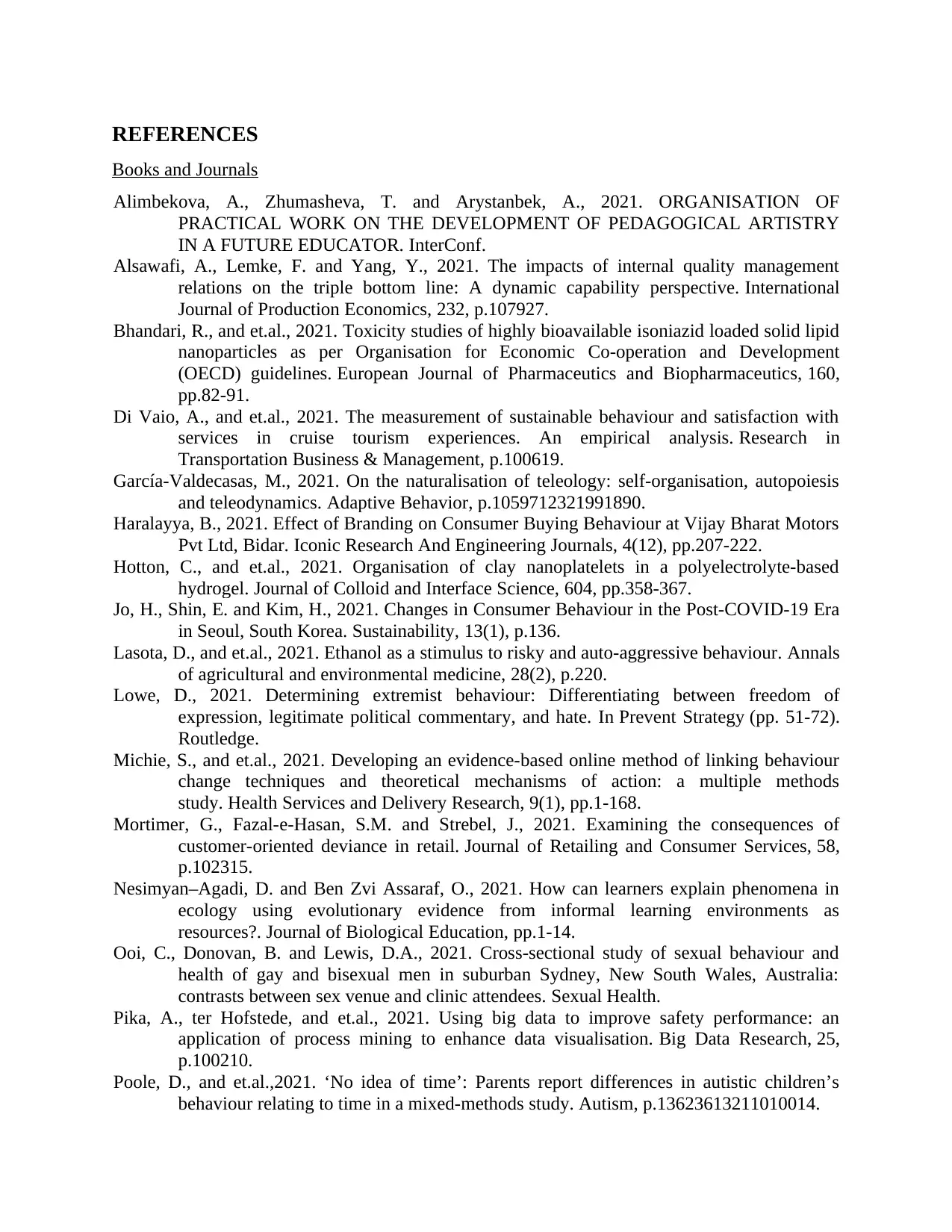
REFERENCES
Books and Journals
Alimbekova, A., Zhumasheva, T. and Arystanbek, A., 2021. ORGANISATION OF
PRACTICAL WORK ON THE DEVELOPMENT OF PEDAGOGICAL ARTISTRY
IN A FUTURE EDUCATOR. InterConf.
Alsawafi, A., Lemke, F. and Yang, Y., 2021. The impacts of internal quality management
relations on the triple bottom line: A dynamic capability perspective. International
Journal of Production Economics, 232, p.107927.
Bhandari, R., and et.al., 2021. Toxicity studies of highly bioavailable isoniazid loaded solid lipid
nanoparticles as per Organisation for Economic Co-operation and Development
(OECD) guidelines. European Journal of Pharmaceutics and Biopharmaceutics, 160,
pp.82-91.
Di Vaio, A., and et.al., 2021. The measurement of sustainable behaviour and satisfaction with
services in cruise tourism experiences. An empirical analysis. Research in
Transportation Business & Management, p.100619.
García-Valdecasas, M., 2021. On the naturalisation of teleology: self-organisation, autopoiesis
and teleodynamics. Adaptive Behavior, p.1059712321991890.
Haralayya, B., 2021. Effect of Branding on Consumer Buying Behaviour at Vijay Bharat Motors
Pvt Ltd, Bidar. Iconic Research And Engineering Journals, 4(12), pp.207-222.
Hotton, C., and et.al., 2021. Organisation of clay nanoplatelets in a polyelectrolyte-based
hydrogel. Journal of Colloid and Interface Science, 604, pp.358-367.
Jo, H., Shin, E. and Kim, H., 2021. Changes in Consumer Behaviour in the Post-COVID-19 Era
in Seoul, South Korea. Sustainability, 13(1), p.136.
Lasota, D., and et.al., 2021. Ethanol as a stimulus to risky and auto-aggressive behaviour. Annals
of agricultural and environmental medicine, 28(2), p.220.
Lowe, D., 2021. Determining extremist behaviour: Differentiating between freedom of
expression, legitimate political commentary, and hate. In Prevent Strategy (pp. 51-72).
Routledge.
Michie, S., and et.al., 2021. Developing an evidence-based online method of linking behaviour
change techniques and theoretical mechanisms of action: a multiple methods
study. Health Services and Delivery Research, 9(1), pp.1-168.
Mortimer, G., Fazal-e-Hasan, S.M. and Strebel, J., 2021. Examining the consequences of
customer-oriented deviance in retail. Journal of Retailing and Consumer Services, 58,
p.102315.
Nesimyan–Agadi, D. and Ben Zvi Assaraf, O., 2021. How can learners explain phenomena in
ecology using evolutionary evidence from informal learning environments as
resources?. Journal of Biological Education, pp.1-14.
Ooi, C., Donovan, B. and Lewis, D.A., 2021. Cross-sectional study of sexual behaviour and
health of gay and bisexual men in suburban Sydney, New South Wales, Australia:
contrasts between sex venue and clinic attendees. Sexual Health.
Pika, A., ter Hofstede, and et.al., 2021. Using big data to improve safety performance: an
application of process mining to enhance data visualisation. Big Data Research, 25,
p.100210.
Poole, D., and et.al.,2021. ‘No idea of time’: Parents report differences in autistic children’s
behaviour relating to time in a mixed-methods study. Autism, p.13623613211010014.
Books and Journals
Alimbekova, A., Zhumasheva, T. and Arystanbek, A., 2021. ORGANISATION OF
PRACTICAL WORK ON THE DEVELOPMENT OF PEDAGOGICAL ARTISTRY
IN A FUTURE EDUCATOR. InterConf.
Alsawafi, A., Lemke, F. and Yang, Y., 2021. The impacts of internal quality management
relations on the triple bottom line: A dynamic capability perspective. International
Journal of Production Economics, 232, p.107927.
Bhandari, R., and et.al., 2021. Toxicity studies of highly bioavailable isoniazid loaded solid lipid
nanoparticles as per Organisation for Economic Co-operation and Development
(OECD) guidelines. European Journal of Pharmaceutics and Biopharmaceutics, 160,
pp.82-91.
Di Vaio, A., and et.al., 2021. The measurement of sustainable behaviour and satisfaction with
services in cruise tourism experiences. An empirical analysis. Research in
Transportation Business & Management, p.100619.
García-Valdecasas, M., 2021. On the naturalisation of teleology: self-organisation, autopoiesis
and teleodynamics. Adaptive Behavior, p.1059712321991890.
Haralayya, B., 2021. Effect of Branding on Consumer Buying Behaviour at Vijay Bharat Motors
Pvt Ltd, Bidar. Iconic Research And Engineering Journals, 4(12), pp.207-222.
Hotton, C., and et.al., 2021. Organisation of clay nanoplatelets in a polyelectrolyte-based
hydrogel. Journal of Colloid and Interface Science, 604, pp.358-367.
Jo, H., Shin, E. and Kim, H., 2021. Changes in Consumer Behaviour in the Post-COVID-19 Era
in Seoul, South Korea. Sustainability, 13(1), p.136.
Lasota, D., and et.al., 2021. Ethanol as a stimulus to risky and auto-aggressive behaviour. Annals
of agricultural and environmental medicine, 28(2), p.220.
Lowe, D., 2021. Determining extremist behaviour: Differentiating between freedom of
expression, legitimate political commentary, and hate. In Prevent Strategy (pp. 51-72).
Routledge.
Michie, S., and et.al., 2021. Developing an evidence-based online method of linking behaviour
change techniques and theoretical mechanisms of action: a multiple methods
study. Health Services and Delivery Research, 9(1), pp.1-168.
Mortimer, G., Fazal-e-Hasan, S.M. and Strebel, J., 2021. Examining the consequences of
customer-oriented deviance in retail. Journal of Retailing and Consumer Services, 58,
p.102315.
Nesimyan–Agadi, D. and Ben Zvi Assaraf, O., 2021. How can learners explain phenomena in
ecology using evolutionary evidence from informal learning environments as
resources?. Journal of Biological Education, pp.1-14.
Ooi, C., Donovan, B. and Lewis, D.A., 2021. Cross-sectional study of sexual behaviour and
health of gay and bisexual men in suburban Sydney, New South Wales, Australia:
contrasts between sex venue and clinic attendees. Sexual Health.
Pika, A., ter Hofstede, and et.al., 2021. Using big data to improve safety performance: an
application of process mining to enhance data visualisation. Big Data Research, 25,
p.100210.
Poole, D., and et.al.,2021. ‘No idea of time’: Parents report differences in autistic children’s
behaviour relating to time in a mixed-methods study. Autism, p.13623613211010014.
Secure Best Marks with AI Grader
Need help grading? Try our AI Grader for instant feedback on your assignments.
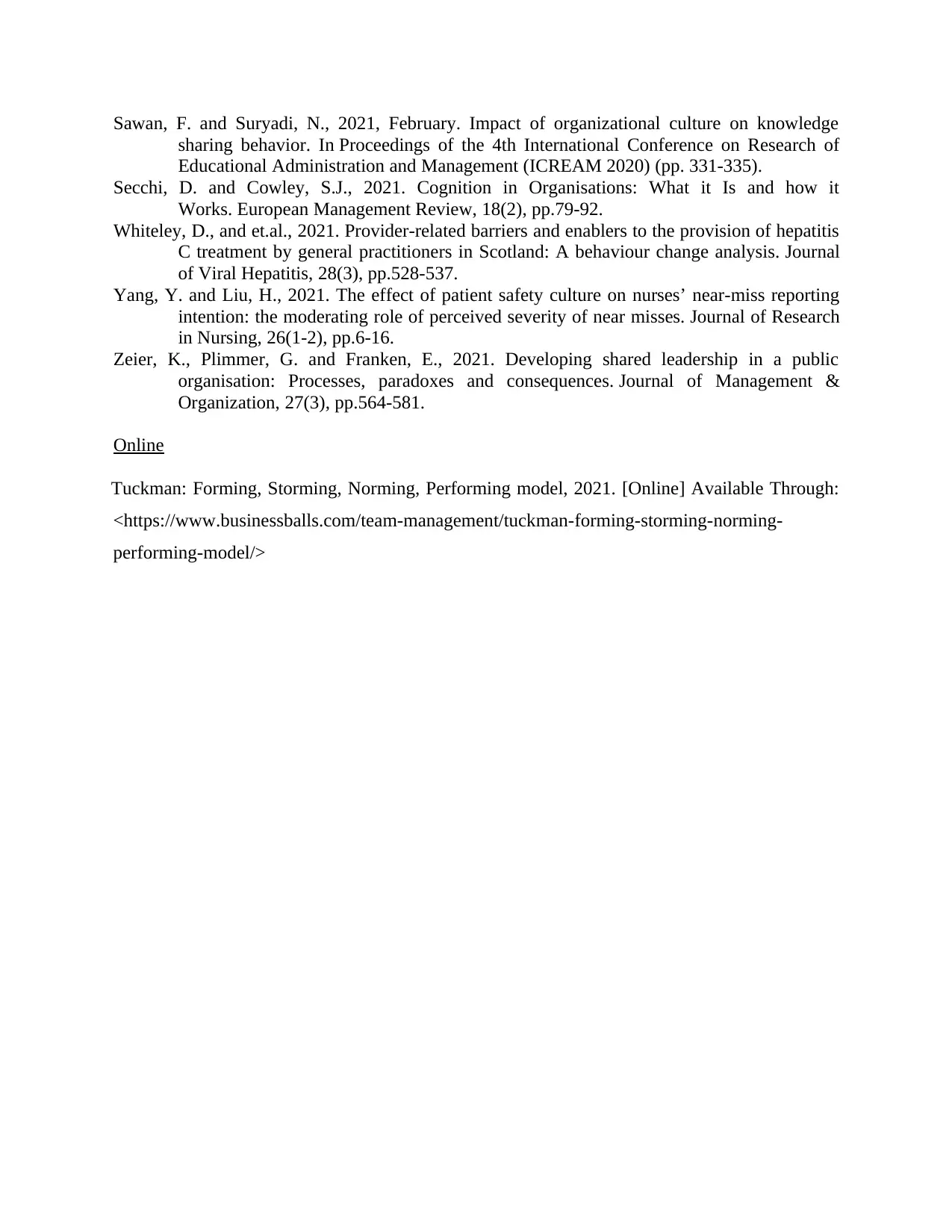
Sawan, F. and Suryadi, N., 2021, February. Impact of organizational culture on knowledge
sharing behavior. In Proceedings of the 4th International Conference on Research of
Educational Administration and Management (ICREAM 2020) (pp. 331-335).
Secchi, D. and Cowley, S.J., 2021. Cognition in Organisations: What it Is and how it
Works. European Management Review, 18(2), pp.79-92.
Whiteley, D., and et.al., 2021. Provider‐related barriers and enablers to the provision of hepatitis
C treatment by general practitioners in Scotland: A behaviour change analysis. Journal
of Viral Hepatitis, 28(3), pp.528-537.
Yang, Y. and Liu, H., 2021. The effect of patient safety culture on nurses’ near-miss reporting
intention: the moderating role of perceived severity of near misses. Journal of Research
in Nursing, 26(1-2), pp.6-16.
Zeier, K., Plimmer, G. and Franken, E., 2021. Developing shared leadership in a public
organisation: Processes, paradoxes and consequences. Journal of Management &
Organization, 27(3), pp.564-581.
Online
Tuckman: Forming, Storming, Norming, Performing model, 2021. [Online] Available Through:
<https://www.businessballs.com/team-management/tuckman-forming-storming-norming-
performing-model/>
sharing behavior. In Proceedings of the 4th International Conference on Research of
Educational Administration and Management (ICREAM 2020) (pp. 331-335).
Secchi, D. and Cowley, S.J., 2021. Cognition in Organisations: What it Is and how it
Works. European Management Review, 18(2), pp.79-92.
Whiteley, D., and et.al., 2021. Provider‐related barriers and enablers to the provision of hepatitis
C treatment by general practitioners in Scotland: A behaviour change analysis. Journal
of Viral Hepatitis, 28(3), pp.528-537.
Yang, Y. and Liu, H., 2021. The effect of patient safety culture on nurses’ near-miss reporting
intention: the moderating role of perceived severity of near misses. Journal of Research
in Nursing, 26(1-2), pp.6-16.
Zeier, K., Plimmer, G. and Franken, E., 2021. Developing shared leadership in a public
organisation: Processes, paradoxes and consequences. Journal of Management &
Organization, 27(3), pp.564-581.
Online
Tuckman: Forming, Storming, Norming, Performing model, 2021. [Online] Available Through:
<https://www.businessballs.com/team-management/tuckman-forming-storming-norming-
performing-model/>


1 out of 19
Related Documents
Your All-in-One AI-Powered Toolkit for Academic Success.
+13062052269
info@desklib.com
Available 24*7 on WhatsApp / Email
![[object Object]](/_next/static/media/star-bottom.7253800d.svg)
Unlock your academic potential
© 2024 | Zucol Services PVT LTD | All rights reserved.




